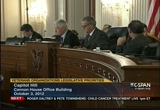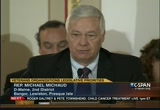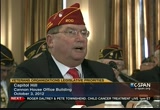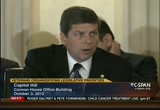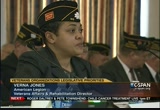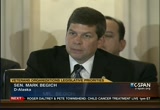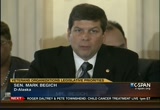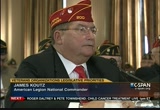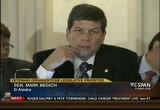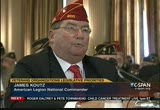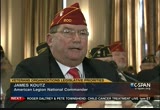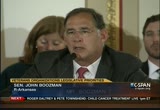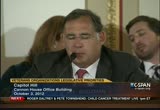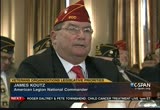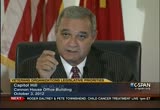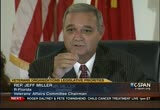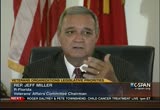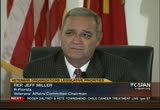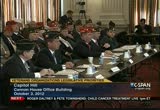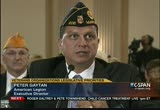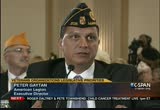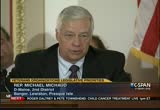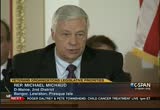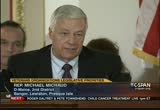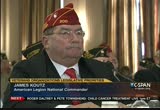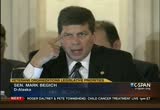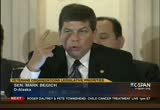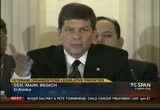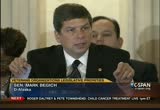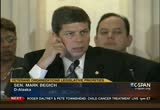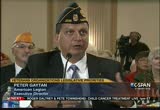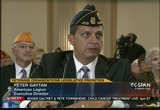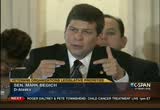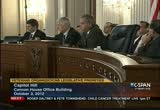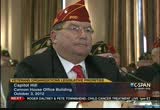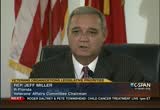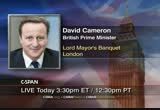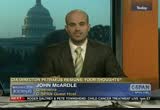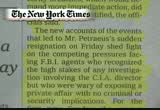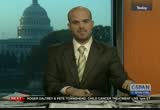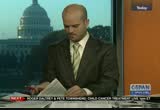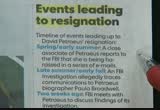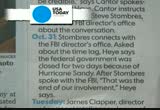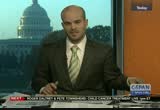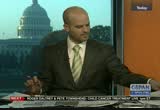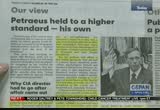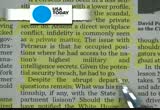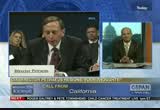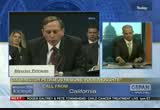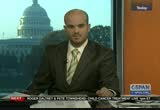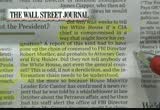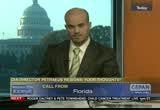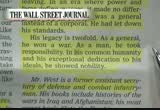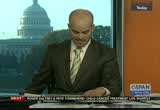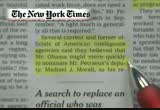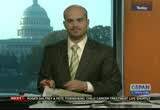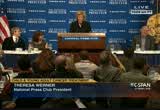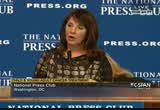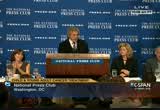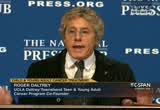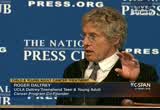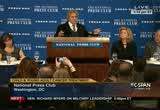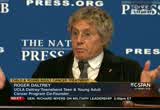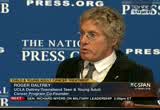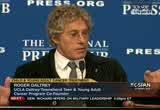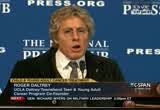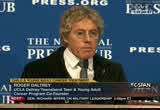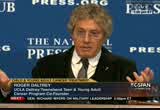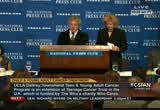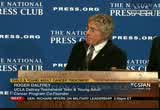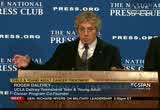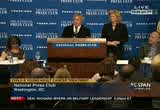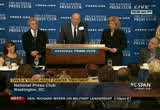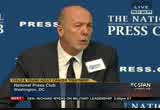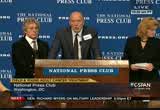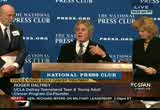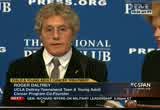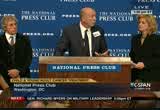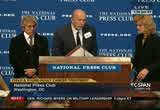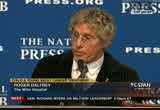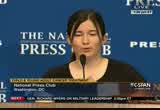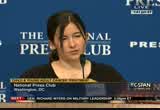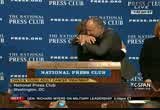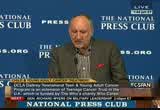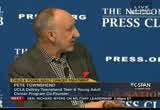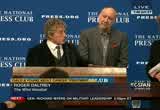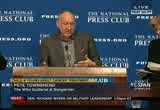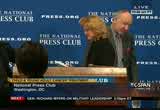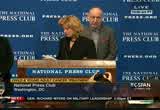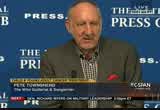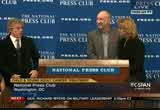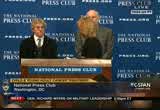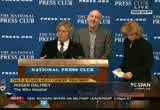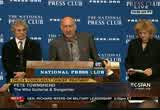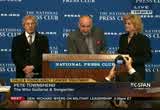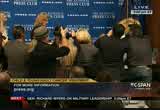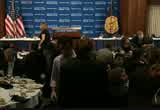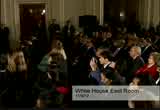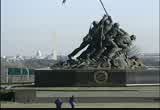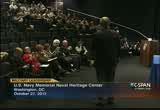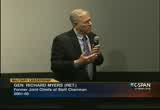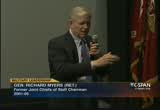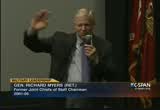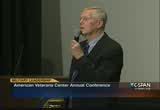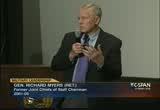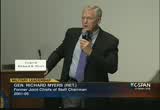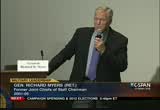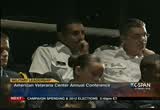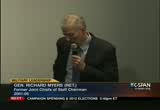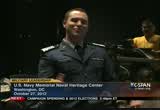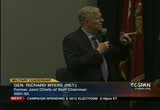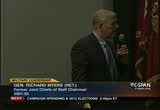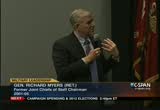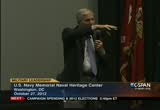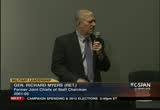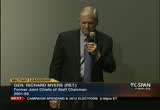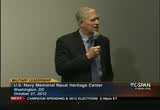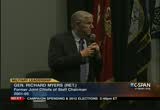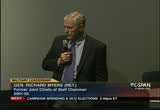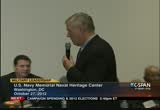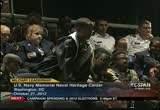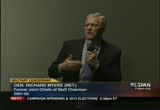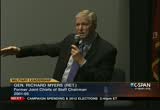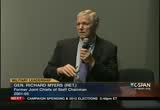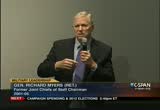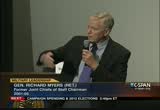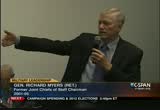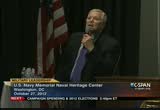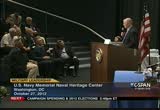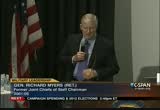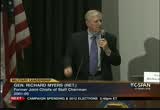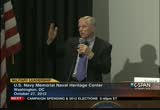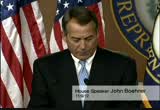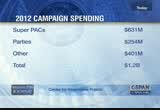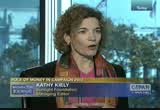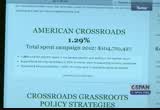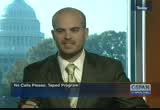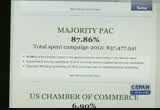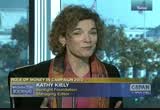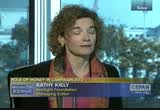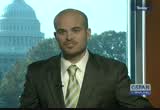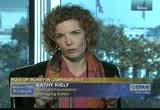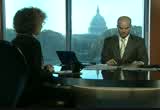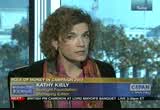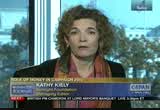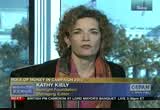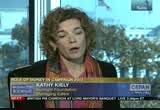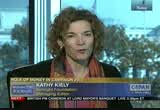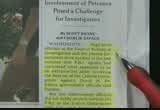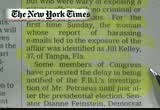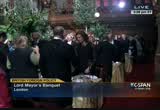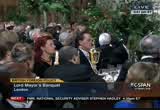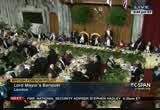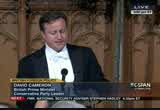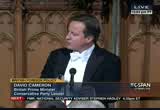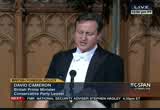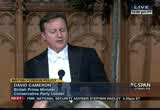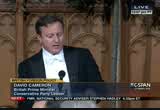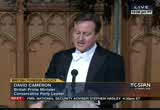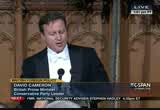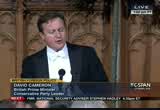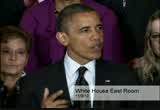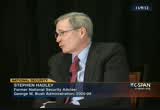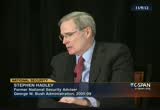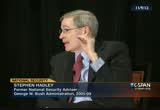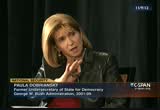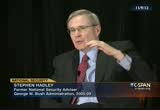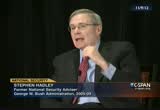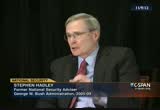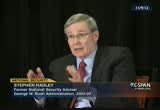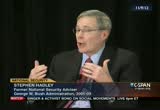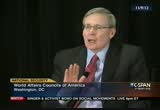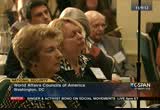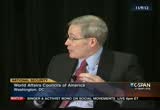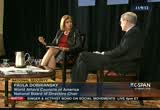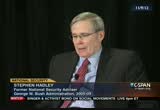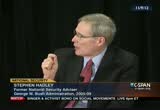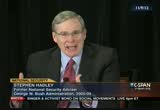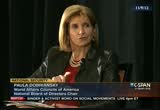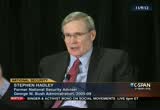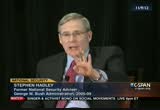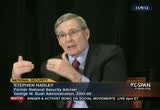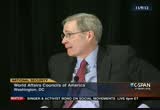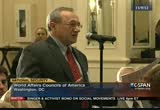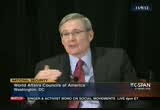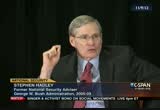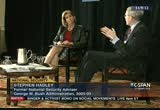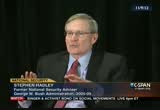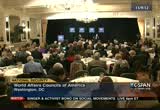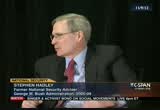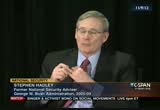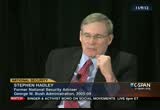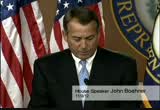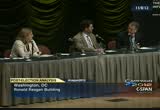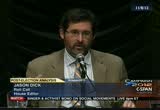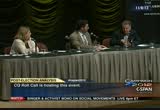tv Public Affairs CSPAN November 12, 2012 12:00pm-5:00pm EST
12:00 pm
belief of the substantial force over athletes wearing chinese- made uniforms, that this is one in 2014. i am reluctant to do that. issue we all can agree on. america has sacrificed so much blood and treasure there, but it is precisely because of that that i think we have to have a even candidates for president presence on the ground, because of the united states are criticizing one another over not this cake will not be cut by being tough on china. 2014. lastly, i do not think still i are making sure more things that we spend enough time are stamped and to appear we focusing on pakistan. i think that pakistan is like a bad marriage with no prospect for divorce. [laughter] make sure that our american there is no alternative to working in there, and connie is soldiers are not treated as .econd-class citizens fea giving me a thumbs-up, she will talk more about that. it is a very difficult at is what they're fighting for. relationship and we need to look at it in two parts. i find it extremely concerning. short run, we have to get them to work with us to deal with
12:01 pm
of this issue is not an issue terrorist problems in the that needs congress to act. region that do not just threaten it is not an issue that we need a regulatory agency to address us, but in pakistan itself. it is an issue that is already we have to work that angle. second, we have to make it the law. clear that we care about what happens to pakistan, putting what is the position? aside our own interests. do you believe our soldiers are putting their lives on the line, shouldn't they be wearing clothing made in the united there is a part of our policy states of america? that needs to be looking at the long term, trying to help >> the answer is yes. the american legion believes that. pakistan the institutions. [applause] so, we have to have a two tiered strategy. i think we spend too much time i am sure it the american people on the first, not enough on the believe all equipment should be second. but there is a panel coming with made in united states of america. there you go again. great experts who will tell you we're talking about jobs. the real answer. i will tell you after i have set put americans toward making
12:02 pm
these boots. that will provide jobs here at the stage a bit. home. >> if people have questions, >> i want to thank you very much. for the record, i know please just come up to the mike. china, henry kissinger was and congressman duncan hunter calling from california, he and i are writing a letter. we encouraged our colleagues to sign that letter to the administration, requiring them he did not like the position of to comply with the intent of the canada it romney or president obama. what do you think? law. it is unfortunate we have to do what is the right way forward that. with relations with china at hopefully we will see some this time? changes in that regard. thank you. >> you all know this, but what you hear from barack obama or mitt romney, the candidates, is >> thank you very much. going to be different from what you will hear from barack obama, in march, we are going to hold a president, or mitt romney, president. jobs fair for veterans. it is interesting. there is an incredible amount of folks that come up.
12:03 pm
one of them, it kind of summed was meeting with franchiser this morning. up the meeting and had in they have a new initiative to beijing one week ago. help veterans get inside that you start -- talking about business. we are excited by what that china, arian harassing men. means. he mentioned 244,000 claims. he said something in chinese, the translator said america and china are not rivals. do you keep track of the i thought that that was acceptance rate? do you submit them? interesting. he stopped the translator it how often do they make it said -- we are rivals, i did not through the system successfully? >> thank you. say we were not, but we are on the same side. he captured something important it takes so long for them to there. the way you need to think about travel through the system. china is this way. it is impossible for us to keep it is a huge country, the an accurate accounting of how many did not. world's most populous. i will tell you that at the it is trying to change at a rate board of veterans' appeals, we and on a scale that the world keep track of the claims that has never seen before. are returned. that is a very hard thing to do. i think we need to think about
12:04 pm
china in two ways. to extent, they want what most it breaks down how many claims countries want, a country that every year. they did not break them down by is prosperous in the world, and the power of attorney for each organization. >> my bet is your offices are that would be good for china buffs in the world, no matter doing a great job. if it is working so successfully, maybe there is an the problem that you care about, opportunity to streamline its climate change, proliferation, even more. if your are having a very high resource competition, we cannot success rate, maybe there is a solve those without china and the united states. way to look at the process and slim it down a little bit. your rate of success should be a in the sense that their ninth benefit to you and the veterans two deferred to their neighbors and compromise their interests, who are receiving it. to the extent that they want to
12:05 pm
the high and that is why it is we asked them for the number yesterday it. we expect to receive them shortly. so poor and for us to be >> we share that with us individually? present militarily and not only, but diplomats a plea in that would help us make the case every way. for why your service officers can process this. to deter them from being tempted to go against neighbors. i'm a the be a duplicate some of the work. that is the line we have to it is like maybe we can cut some walk with our china policy. of that bout. it is complex, but i think it is doable. >> so, you do see it happening, despite the sentiment held by congress on the issue of china? maybe you can get some comments >> part of that is the duality. on this. i know it is a big issue. we are shoveling on the armed part of that is china has to play by the rules. they have to play by the rules services committee. we have been successful in of international order, and have getting mental health service providers or at the battlefield. to cut the governor was
12:06 pm
criticized for this, there has i know the beva is agreeing to to be in plain view and the chinese need to understand that. it is part of this tension that hire more services. will have to be worked out. the challenge is getting more in >> do we have any questions from the pipeline. the audience? please come to the microphone. there is an amendment that was >> issues herself >> hank rose. successful which ensured that these mental health services, and no copays are required. he mentioned specifically regarding syria, our goal might it is a huge step in getting better access. be to help the opposition organize and become more d who know how we can get more democratic. access? you might have the same >> hiring with the percentage of description of four other errors string were rebellions >> we the traumatic brain injury, we will take both.
12:07 pm
know that is going to increase. aha -- >> in your very interesting exchange with professor newman about afghanistan, you made a very so i think we're going to have to get where we can train, train strong case that we needed these people so we can take care political transition in 2014. of these soldiers when they come home. i understand the rate is maybe 50% if not more of these what i do not see in the riding returning soldiers coming back from arrange or iraq -- of this subject is why we need to more years of combat operations. afghanistan or iraq with these problems. i think the sooner we get this job done the better their going other than training the afghans, to be. which is more or less working, i >> i caught most of your testimony because i came in do not see the -- i think just as you were starting and i they're making actually going just wanted to ask, i didn't hear you mention the g.i. bill and i'm wondering are there things we should look at to improve? i know we made one improvement backwards, creating more and we're getting a lot of use animosity. why could we not stand down and just continue the training exercise? blacks i see your point, but i
12:08 pm
do not think we can. there are three things the military is doing that he of to be done. on the g.i. bill. >> the g.i. bill is in good shape right now. you cannot train and afghan army if you are throwing them in the only thing i think the with the front line before they american legion is concerned about is we need to keep are ready. watching and see how things are going incase we need to improve it takes time to get them to it. the point where they can pay there is always room for improvement in the g.i. bill but right now we have no major for the responsibility of issues with the g.i. bill. security. there is a lot of treating of >> thank you mr. chairman. the enemy that needs to be done. we are trying to bring the senator boozman. taliban capability down and the >> thank you mr. chairman. commander, you can have great afghan capability up, so that benefits but if you can't access them, it's a real problem. and i know you have been working hard for our rural they cost. veterans to ensure the accessibility is . so that they have enough there we've been working and capability to deal with it. that is what we're trying to do. actually passed a bill in committee that would require the that is why our troops are out office of rural health to put a of iraq. specific strategic plan how to do that. i know you have been very active in that regard. they are not ready for any election today.
12:09 pm
can you elaborate on how you feel we can do a better job in serving our rural veterans. what i hope will happen, what i know there is a move to expand the census bureau john wrote about, this -- there needs to be a broad political settlement. most hostile towards their government, they think it is corrupt. this electoral process, getting definition. again, if you could elaborate a little bit. the government out pakistan, the army has something to fight for. >> well, the american legion believes to take care of this healthcare problem we have, we need to add more out patient there just is no substitute for education. clinics, more doctors so we can take care of this. i wish that there were. some veterans are driving up to we have been there long time. four hours. i just do not see a substitute. and then when they get there they can't get in. so the problem is we don't have enough staff, doctors and the medical equipment. there is a wise man that someone should get to come so if we maybe add staff, add speak. more clinics to take care of the he is here in washington. rural veteran, i think that he was the deputy prime would be a big asset to helping
12:10 pm
these veterans. minister and the foreign prime minister to jordan. a wonderful guy. he said something that stayed with me. that there are too great traditions in the middle east, >> and telemed vans, things like that? >> sure. arab nationalism and political islam. >> we appreciate your efforts no doing that. it's interesting, we're working the problem is inclusiveness and and you have some large cities in this state but it's a very pluralism are not part of either rural state as is arkansas and so many places that we of those traditions. represent. that is the problem in the i mentioned the licensing and middle east. how it came up with the police. i know you are on the cutting a sense of inclusion, of edge of that. i think you had a summit. tolerance. can you tell me a little bit and that is one of the problems in getting to a democratic outcome. the other one starts democracy about how that went and some of from the bottom up, which is the sessions that you had in that area? helping these countries to get >> i didn't understand your question. >> the credentialing, making it in a tradition of greater such that -- transparency to the people, a >> just like the veteran skills jobs act. as i said in my statement that greater accountability of the government to get issues like if you're a hum vie driver in
12:11 pm
afghanistan dodging land mines then when you come home you corruption. ought to be able to be a truck and greater accountability. driver. that is, if you think about it, we think of democracy and we or if you're a medic you ought to be able to come home and not think separation of powers, go through step one in being an e.m.t. i think you're working in the right direction and we're working in the right direction to make this better for our three branches of government, house and senate. what democracy starts with its transparency, accountability, and responsiveness. those other kinds of principles we need to be encouraging in the middle east. because of the dearth of power, veterans and our service members it will take a long time. when they come home. but it is important work for stability in the middle east and for the middle east to finally begin to deliver for its people. >> the congressman, the chairman mentioned what's on all of our minds, the backlog and stuff and how we can be helpful. >> steve, concluding question, can you explain the mobile phone app, the claims coach what that what do you see as the role of is going to be about and how the united states in the world today? there is the day amongst that is going to be helpful. foreign-policy experts on american exceptional was and,
12:12 pm
the decline of the u.s. role, the desire to pull back. you gave advice to the world >> i will let verna jones answer affairs council before. that question. >> our claims coach mobile app what is their role? is set up to help veterans down >> the world affairs council, loan on their phone to direct you are a wonderful forum in them to their service officer and what documents they need to be bring in and help them put in local communities across this their zip coat and determine country, bringing people together from all walks of life, having a debate on these issues. which service officer is closest to them. the foreign policy debates of so the mobile app is going to our presidential campaigns are, set them up when they walk into i find, quite vacuous and full the office they're more able to of straw man red herrings and do not get to the real issues. have a fully developed claim well, in your forms, you can get that will go through the system to the real issues and invite more quickly. politicians to hold their feet we're excited about the mobile claim app and hope they will to the fire and do not expect down load that to help them file these kinds of superficial their claim. >> i think that will be very, very helpful. answers, which we get from campaigns.
12:13 pm
i have been in washington for a long time, too long, but my wife is a washingtonian, so we are still here, and every 10 years just one last thing commander, can you elaborate on your you get this narrative that comment regarding the v.a. america is in decline, healthcare system that growing number of female veterans in a system that has traditionally overstretched, downsize your catered to men must adapt to meet the needs of the objectives. we heard this in 1989 just population. with us having so many more before the wall came down, the soviet union broke up, and communism was discredited, people were writing books about females in the military. if you could elaborate on that and tell us how you feel the department can america in decline. the truth is, the sad news is, there is no substitute for the energy and leadership that the united states brings of the world. and if you do not believe in it, talk to the chinese. they will be the first ones to tell you, as they told me, that they had no interest in displacing the united states. we have seen what it is like to
12:14 pm
be the goat -- be the global leader. it is hard, takes a lot of money, a lot of global effort do? and resources. you can have it. the truth is, no one else can do it. i think we may be need to do a we're still the number one better job in taking care of our economy in the world, with the biggest and most effective females. military. we still have a wonderful what i have been trying to do is university system with a trying to get a woman's veteran tradition of entrepreneurship coordinator in every department. and innovation. we're going to get all the more importantly, we are kind committee together. i am hoping the american legion will get these female of the world's broker. coordinators together. they can tell us the need they we stand for principles of freedom in the free-market, need to have. then we can relate it to you. treating people with respect. >> thank you. something that the world still admires. i would give you a concrete >> thank you very much. example. you are talking about the gi bill. secretary clinton asked me to join three other people and go
12:15 pm
one eddied things the leaching can help us with as we have just to tokyo and beijing and meet changed into a new fiscal year with those political leaders is what the veterans retraining about this dispute between japan and china over these islands. resistance program. i think we did 45,000 a week. basically, sending a message of -- let's turn down the rhetoric. don't let this turn into the conversation that will destroy the economic prosperity of two decades. we action organize 99,000 i thought to myself -- why do we have to do this? totals. the numbers i have today there we, the united states of america. the truth is that in asia, like so many other places, it is is still roughly 30,000 books ironic, but the united states has better relationships with that can access these for each of the major countries than any of them have with each other. retraining. i would like to ask for your and that gives us really, a allegiance in getting the word out to those individuals. very unique way to be a force to we focus a lot on the younger help those countries.
12:16 pm
returning veterans. it is that way in asia, i think this is focused on 35 to 60 year-old folks to get the retrained into the workforce. it is largely an issues like the israeli-palestinian question i just bring that to your that we have the same role in attention. the middle east. you talked about the heroes act. the other thing that we do is we that was part of it. have what the world views as we would like to ask for your naive, but americans have this assistance with getting the word notion that our job is not just out. to manage problems, we actually we're talking about mental- try to fix problems. health. anytime you talk about going most of the world thinks that is outside the norm, we get some a fool's errand. visceral responses. we have a roundtable discussion this relentless optimism that we with some of the veteran service can actually do better. organizations recently here in if only we could get organized. you know, it is a burden that we talking about mental-health and how we get the patient to get to carry, but also a great opportunity, because our own prosperity increasingly depends on what happens out there in the the provider. it takes them so long to hire rest of the world and we have an somebody, especially somebody enormous opportunity to shape that world in a way that will be that is accredited was some type of medical degree, whether it is
12:17 pm
more prosperous, stable, and a nurse or a psychiatrist or more secure for our children. psychologist, optometrist. that is a great shot -- great privilege. it is a great privilege to be there has been some discussion about opening try care to give the united states and a great privilege to represent this country. the option for folks to either >> stephen, it has been a great privilege to have you here this stay in the traditional va morning. c-spa[captioning performed by track are go into the try system national captioning institute] still being managed by va. [captions copyright national cable satellite corp. 2012] >> in about one hour, we will we could double the amount of have a speech from bo no. providers overnight if we read able to do something. are you willing to look at these tomorrow, "washington journal," ronald kessler looks at the intelligence administration options to help solve what after the resignation of general literally is a crisis in this country? david petraeus. then a look at gridlock in our mental help backlog is washington. after that, foreign policy something not to be proud of. magazine editor, benjamin we have to provide it quickly to parker, on the reaction to the those in need. president's reelection.
12:18 pm
live, tomorrow morning, on c- some of them are in rural areas. span. >> 2013 should be the year that they talked about the great success of the mental health. we begin to solve our debt, tax it may be somewhat different in the beginning. reform, and entitlement reform. i am proposing that we can avoid i would like to ask what the legion's position, if any, on exploring the opportunity. >> let me say a few words before turning it over to our director. a fiscal cliff together in a we understand it is a big issue manner that ensures that that is the year that our government and there are problems there. finally comes to grips with the major problems facing us. >> i am open to proposing that n we're going to have to train the to new ideas, committed to people to take care of these solving fiscal challenges. missile health -- mental health. but i refuse to except any approach that is not balanced. a lot of these people do not i am not going to ask students, want to come. they want to stay in the back. seniors, and middle-class families to pay down the entire i think with your help and our deficit while people like me, help we can go to those people and get them out and get the making over $250,000, are not help they need. with that i will turn it over to have to pay more than one dime peter, our executive director. more. >> thank you. that is a real issue, beginning >> the current congress is in
12:19 pm
with the access to mental what is to be referred to as a health. the access to mental health lame duck session, including the right now is efficient. expiration of the bush era tax you mentioned tele-help. cuts, raising the debt ceiling by how much, with planned cuts to domestic and military it will be a growing problem. spending. follow all of the debates on specifically with the suggestion of opening up try care and tuesday, 2:00 p.m. eastern, live house coverage on c-span. utilizing try care, -- tri-care >> i enjoy watching boat tv and and utilizing tri-care, we would the rebroadcast of the various like to see the reality of that television news programs. being in at that. how much will it improve our veterans access to health care speak -- c-span provides end to end coverage of these events. they need? when you're looking at the new really getting an opportunity to demographics of returning veterans, we have talked about rural health care, we are at a consume that information, time when we are relying more making my own mind on what is going on. c-span is kind of a great way to and more on our reserve service members to serve. get an unfiltered view of the day's events. >> era kill watches c-span on they are returning to their comcast. created by america's cable rural areas that are not companies in 1979.
12:20 pm
supported with military treatment facilities. brought to you by your they may not have a va facility television provider. nearby. they are not is coming back to >> the house and senate are the and they know. coming back into session they're coming back into the tomorrow. next, house and senate civil world. leadership election in the 113th that time between combat to the time they're walking down main congress. this is part of the roll call street, u.s.a. is short. post-election analysis. those individuals are the ones we need to capture and utilize a it is about one hour. new ideas andtri-care in >> i will start to chat as my contracting out mental health care when appropriate. colleagues join us. we thought that we would make it of these are the themes we need up this time, we have two to look at. i think the tri-care discussion people how eminently qualified to talk about the new membership of congress and new power is part of a larger equation of structure of congress. on my right, the house editor at how can we develop as many options as possible to reach roll-call. these returning veterans who to his right, emily pierce who have these very dire mental
12:21 pm
health care needs? va does take a long time to better to discuss the new and utilize new employees. leadership structure? this is an area we need to concentrate on. as your guide remind you, after the american legion is talking to you and your staff to better two consecutive congresses where understand those options. we have an obligation to the female population was stuck at 17%, it has gone up to 20% in realize how much that try care opportunity will help the situation. the senate. and at least 18% in the house. we can reduce the mental health congress will have its first care access and reduce the hindu member next year. combat troops coming back. >> thank you. >> do not get too comfortable another little-known water cooler fact, for the first time in america's history, an entire congressional delegation will be women. all four from new hampshire will with the gavel here. be occupied by women. thank you very much, mr. still, a long way to go to it to chairman. i would like to access the same 50%, but i guess that is some
12:22 pm
line of thinking. progress. when you look at a state like maine, a very rural state, access is an important issue. the house democrats for the when you look at what we're first time,, white men will make seeing in the military today with the increase in suicide rates as well as within our up a minority of the crowd. veterans population, i just saw a documentary "the invisible as you may know, three of the four leadership elections on a war" with sexual assault and calling card for the lame-duck some of the problems are female session. veterans have. access is important. i like to think the american the real legislating will be cut off until after they've given. legion for putting out a system worth saving. this is all about leadership that is a very good document elections. that i enjoy reading every year. we will go to jason first to it really highlight some of the give us a handicap on the issues out there. republican and democratic house falling on the same train of elections. thought that the chairman brought out, when a look at access whether it is tri-care, utilizing our federal qualified health care clinics, i can
12:23 pm
understand some of the currents that the veterans might have. i do not want the va to be an >> thank you, david. insurance agency were they will it is nice to be here. i hope everybody has caught up on their sleep. pay for services outside. the sleep deprivation quotient there is a very important role in washington is up the first day after the election. for the va to play. house tart with we have to do everything we can to make sure that our veterans get the health care that they republicans. at the top there were not be need, when they needed. much of a change. boehner will be the speaker of when you look at the back -- the house unless something fact that he has agreed to hire unforeseen happens in the next few weeks. those in the mental health, the problem there is already 1500 he will keep the reins. the republicans lost a few vacancies that he has had over a year in the mental health area. seats, but that is not going to affect him. i am very glad that you are looking at the tri care system. he ran unopposed in ohio for his own race, and the defining i think it is very importantly look at everything we have to
12:24 pm
conflict of the republican conference in the 112th congress, the conflict between .ppea eric cantor and john boehner the speaker is really behind them from everything we have seen. that is remarkably stable, the if you look at rural state such first three positions. as maine and uniqueness, whether john boehner will be the next it is alaska or some states that have a lot of islands and speaker, eric cantor will be veterans trying to get health the majority leader, and kevin care that they need when they needed, which also be willing to look at in the rural areas if they do not have tri-care mccarthy will be the majority whip. where it gets interesting is for services, if there might be some the conference chairman position. that is currently held by jeb collaborative effort we could hensarling, who has been a utilize by health-care clinics rising star for a while within republican ranks. he was a republican study to get those types there. committee chairman, which is the top conservative position in republican circles in the house. there are two people making a run for conference chairman, i am not advocating that the va tom price, who is also a former committee chairman of the past. sent everything out. i do think there should be some medium ways where we can look at he is currently making a bid the veterans of getting the care for conference chairman, and then cathy mcmorris rodgers, they need and at the same time and they represent two different modes of the republican party at making sure that the va medical this point. cathy rodgers is an effective surrogate for romney. she is from the tom foley facilities are still a primary
12:25 pm
district in central south focus for our veterans. washington. it is an agricultural area. did you want to comment on that? spokane is the population >> we are willing to work with center. i believe spokane reaches out to the east, for those of you you on anything to be sure we remember raymond carver stories. she is a charismatic politician. get our bearings -- are she is able to articulate the veterans -- our beterans took republican agenda in a way that is not threatening to people. and she has been running pretty care of. hard. price has kept a low profile, as we talked about the suicide but seems to have accumulated quite a bit of support within rate, that is something we have the republican conference of the last few years. >> are you going to predict a to be sure that we get that nearly stopped. winner? >> i am not. >> and what is nancy pelosi there's way too much suicide going to do for the rest of her going on. it is not just the iraq and life? >> i'm going to call my afghanistan veterans. there are still vietnam veterans lifeline. after dying every day. i do not know the answer is. right now all eyes are on nancy i wish there was an answer to pelosi. take care of these veterans. we are willing to work anyway we about a week and a half ago, mr. pelosi announced that the democratic leadership and can to take care. elections for house were going
12:26 pm
to be moved to after thanksgiving. the house republican leadership elections in the senate and the >> i have a couple more democratic and republican leadership elections are all questions. i want to follow up on the going to be next week. mental health issue. i know the amount of mental this is traditionally when things happen. health providers the va is the fact that she set this off moving forward, led the a couple of weeks led to challenge is the process of hiring in making sure the supply line. you have to have enough people in the pipeline that want to take the jobs in a huge and speculation that she wanted to see how the election would turn growing field nationwide. out, she wanted to have some time to we whether she would we may have to be more creative even retire or resign after in insuring that we get a mental health providers working for the above bad va or in cooperation winning her seat on tuesday. with them and recruiting. there was a lot of speculation that pelosi would leave immediately after the 2010 election. she moved up the elections to they're going to be around for cut back on the amount of time
12:27 pm
that people would be able to many years. organize against her. lima -- me -- we may think about she ultimately made a bid for the majority leader, but lost how we want to incentivize folks to get into this who work with ultimately. there was a lot of consternation the va. among democrats. democrats wanted a little more soul-searching time after losing the seats, and they were not afforded that time. that is a thought we should so we don't know what is going to happen. nancy pelosi is in california. think about. her home in napa valley was the big issue when we dealt with broken into on monday. so she actually has some literal housekeeping to take utilizing our health services care of. apparently people broke in. they don't know what is missing. which are run by the tribal sort of this bizarre thing. consortium for health care in the event she does retire or delivery. resign from congress, steny it was the quality of care. hoyer would be the frontrunner to take over as minority leader. they want to make sure it ever happens big quality care. the subtext -- almost a shakespearean subtext -- the concern is that the va between steny hoyer and nancy offers a certain level. pelosi, they had interned together on capitol hill in the 1960's and they have been rivals but our veterans have found is for years, the last 10 or 12 years competing for leadership that our tribal consortium's positions in the democratic delivers equal or better care caucus. hoyer would very much like to va. bthe be minority leader and he would
12:28 pm
make a bid. the question now is whether the veteran can go to the clinic pelosi is trying to line up somebody who would be her are utilize this service. we think it can increase successor of choice. there is a lot of drama, and we capacity. there are innovative ways to just don't know where the dominoes will fall until we know her intentions. >> just to wrap up -- who is in the next generation of would-be insure the core of the va is party leaders who would like to have pelosi's endorsement or if growing but also making sure we not the endorsement would like utilize some other arenas that we pour in a lot of federal dollars. to move up? >> right now, outside of hoyer, the person most chatter about is chris van hollen, there is a great way to ensure that we keep equal or better representative from maryland, a quality for veterans. democrat, paul ryan's foil on as you look at this, we are the budget committee in the house. going to be here. along with that we are able to put into the defense authorization bill language for active military. if you are a veteran and you're getting mental health services here in washington, d.c., then again, a young, sort of take charge, a charismatic leader. you go home to alaska, you want he raised a lot of money. he ran the democratic
12:29 pm
to get the same mental health congressional campaign service provider. committee for two cycles. and they're not licensed in alaska, not going to happen. we have put some language and to insure that no matter where you go you can still access that doctor. so he has a lot of pull. complicated a little bit by the fact that he and hoyer are maybe you had a hand injury. friends and they represent the this is all about a same state and run in the same circles. he was the assistant to the relationship that you are building with a provider. it is critical that they speaker in nancy pelosi's last term as speaker. continue to have that care for that seems to be the person who what ever they need and want bubbles to the top the most. from wherever they are in this and a question about what debbie country. wasserman schultz will do. we have to think about that. democratic committee chairman. no one does that job too long. she is looking at a way to leadership. we need to do like we did in i hate to use terms like the smart money, but the smart money seems to be if pelosi wants to know if a successor and get armed services. behind somebody, it would be no matter where you live you can access that. i know i'll get in trouble with chris van hollen. >> that shakes. drama makes what is going on in every his state with their the senate look tame by comparison. what is the lay of the land on medical boards and jurisdictions and all that. at the end of the day, if we the senate side? >> i think it is pretty tame in have a veteran who is receiving great care, they should get it
12:30 pm
the senate. with senate democrats adding wherever they move and be able to access that person. two seats -- harry reid, dick durbin, chuck schumer, patty this is a great access point. murray will be carried on please help us here. people's shoulders to reelection as leaders. the other one, this has been a i don't really see any changes challenge. there. one thing we were hearing yesterday on the republican side, because they lost two seats, especially in states like montana and north dakota -- i did not think anybody is blaming john cornyn, the i do not know if you have any chairman, where they lost in missouri -- where candidates made flubs and that turned the race against them. feedback yet from how this is but in red states where republicans should do well like montana and north dakota, they working are not working. i do not know if anyone can did not win those races. comment on that. we were hearing yesterday that people were starting to talk about whether or not they want years ago, they tell me there to make a change there. now and ultimately i think you were 170 slides in the power. , and i said, are you kidding are not going to find anybody me? who either has the juice of the power base or frankly the i would not even pay attention to that. bravery to actually challenge it was a dysfunctional element cornyn, but it is interesting people are talking about it. to try to transition our folks >> just to reiterate it, cornyn
12:31 pm
back into civilian life. does anyone have a comment on the pilot program that was does not want to do the started or how it is working republican campaign -- out? >> i am working on lack of sleep, too. he is running for whip. jon kyl is retiring and cornyn >> we had staff attend the first new pilot program and there was mixed information that we received. wants to move up, number two we sat in with the briefing. under mitch mcconnell. we were impressed with some of this is his second run at nrsc -- they picked up six seats in the information that was delivered. 2010 and here he was expected to deliver the majority at the end of the cycle, but things turned against them. we were very impressed that it but i don't think republicans is going to be mandatory, which it should have been made a long are expecting the kind of rout they saw on tuesday. talking about republicans soul- searching and whatnot, and this time ago. what we were doing was giving our feedback back to the v.a. and letting them know not -- lead in the know where they can utilize organizations like the is part of it. we talked to one senator american legion to express to these individuals held can help yesterday who said we are going them when they transition. the american legion has taken the initiative to author to be talking about a lot of letters to the secretary and different things and how to move forward, and leadership races are a part of that. >> you can't beat somebody with nobody. is there a name? >> john thune, the current conference secretary told us four months that he may make a others to ask if we can work run for whip. he may stay in the current spot together in a more collaborative or make a run for nrsc chairman. way, to share the information on i suspect you will decide to these transitioning veterans. so we can help them before they take the uniform off, and when stick where he is right now. certainly we were trying to get they come back to the rural communities, we can provide
12:32 pm
that much needed help to access those guys on the phone and understand the va. yesterday and they were not taking our calls. it could be there is some the troops do not understand the decision making going on. va. they are going in a direction but i think at the end of the of their lives they did not consider before, either being injured or leaving the military. v.a. and dod should allow us to help but the level we can help. that comes down to collaboration and sharing the information with those transitioning veterans. the tap program is a great approach. we as an organization are part of the process to improve the tap program. does let the american legion be a big part of that. >> thank you very much for that
12:33 pm
comment. i hope i speak for the rest of my colleagues here, anything we can do to make sure, if there is information you are sending that is the audibled, let us know. what i was heard at was the program originally was problematic, to be polite. the test pilot this is critical to make sure it works for veterans who need that information, so i thank you for that. we talked a little bit about women veterans. i know it is a critical issue, it is more of a wraparound service in a lot of ways, everything from health care to child-care and other things. can you tell me one or two or
12:34 pm
three top items that women veterans are saying to you that i wish we could do -- fill in the blank. can you do that for me? >> in 2010 there was a survey, the first national veterans service since 1975. -- since 1985. a lot of things have changed since then. we all surveys for about 30 days and 3012 women responded. what the women told us is that they want quality health care, affordable medications, and fair and equitable compensation, just like our male counterparts. women want to be able to walk into the v.a. health care system and seek -- receive the specific health care that we deserve. recently i was, house floor in
12:35 pm
february. -- in the hospital in february. they did not have a room for it life-threatening condition for 15 hours, because they had to find room for me. women should be able to go into the hospital and get treatment as quickly and as efficiently as male counterparts. we want medical professionals to understand that women need particular things. mammography is one of them. all of the mammograms are outsourced, so we go out on a fee basis to get a mammogram. but it takes a long time to receive the results. we want the v.a. to understand that while we have gender specific differences, we still deserve the same time limits given to our male counterparts. we are not asking to a separate
12:36 pm
facility to walk into. we want a system that includes female veterans. maybe a separate waiting room, especially women veterans who suffer with ptsd specifically due to military sexual trauma. that fell to reduce the standard and women providing the burden of proof to prove their claims of military sexual trauma. we want to be included in that liberalized laws for ptsd. what they told us is that we want fair treatment. we want the v.a. to understand that women are large part of the military, and when we come home, we want to be cared for, just like our male veterans. >> thank you very much. [applause]
12:37 pm
>> senator bozeman? >> thank you, mr. chairman. i really don't have anymore questions. i appreciate your comments, especially coming from somebody that can relate their personal experiences. that is very, very important. i appreciate you sharing your particular ordeal. another committee on both sides are going to be working hard to try to remedy that. there is simply no excuse for that. thank you for being here and we just appreciate your service and we appreciate everyone's service so much. again, we look forward to working with you in the next congress. we just appreciate all of your efforts. >> we thank you, and just let me say that the american legion is
12:38 pm
always here. we want to work with you and do the best we can for the veterans of this nation. >> i would ask unanimous consent that all members would have 5 legislative days to revise or extend their remarks, including the extraneous materials for today's hearing. so ordered, and let me finish by saying thank you so much, commander, for being here and being willing to spend your time helping us understand more what the american legion's perspective is. i can clearly said that without your help, the job would be a whole lot harder. i look forward to working hand- in-hand with you as we move down the road together to try and solve the issues that are there. we look for to having another round table early in the next legislative session, which is right around the corner. we know we have an election in just a few weeks and a lame duck session, and then we will be returning for the 113th congress.
12:39 pm
12:40 pm
will give an address in london. you can see that starting at 3:30 eastern. for aback in washington b speech by bono. live coverage of that begins at 6:00 p.m. eastern. >> c-span request students to send a short message to the president, letting him know what is the most important issue he should consider in 2013. the competition is open to students grades 6 through 12, and that deadline is january 18, 2013. live to the national press club for roger altria and pete townshend upper thof the who. until then, your phone calls
12:42 pm
host: another story from "the washington post" this morning. the headline, "probe of the petraeus investigation." we want to take you to one of those lawmakers now, congressman peter king, he was on "state of the union" this week, expressing concerns over when the fbi, the white house, and members of congress knew about the investigation. [video clip] >> i have questions about the whole matter.
12:43 pm
how to the fbi have been investigating it for this long? and if the general was involved, to me, if it was, the fbi director had the obligation to tell the head of the council at the earliest date. seems to have been going on for several months, but now it seems the fbi did not realize it until election day? it just does not add up, you have this kind of investigation, the fbi investigating emails, taking four months to find out that the cia director was involved? i have real questions about this. the time line has to be analyzed to see what happened. >> it looks like general petraeus will not be testifying this week at the hearings that we talked about on the september 11 incident in benghazi.
12:44 pm
12:45 pm
12:46 pm
too many people in america are involved in infidelity. we tell young people about discipline and the way to do things right, so i think it is a shame. i have a brother who is an airborne rancher and he is not in the army no more. he is still disciplined. this is a travesty, man. host: thank you for the call. this from twitter this morning -- host: here is a timeline of the events leading up to david petraeus'investigation last friday. from "usa today," a report that a woman has been harassed in a series of emails --
12:49 pm
decision, some of whom appeared on the sunday talk shows. i want to take you to diane feinstein, from the senate intelligence committee, on "fox news sunday." [video clip] >> we had no advance notice. it was like a lightning bolt. i came back to washington on thursday night. friday morning the staff director told me that there were a number of calls in the press about this. i called david petraeus. as a matter of fact, i had an appointment with him at 3:00 that afternoon. it was canceled. when these questions came up, obviously at took the action myself to try to find out. and then i informed my vice- chairman and i talked to the director twice. this is very hard stuff. host: we are getting your
12:50 pm
thoughts on the fallout from that announcement. billy, lady lake, florida. caller: good morning. it is a real mixed bag of feelings about things like this. this guy is the head of the cia, and it took us months to find this out? i was trained as a military combat medic, vietnam, and i am gay. i worked in the surgery street -- suite of the recovery unit. two investigators remove me from that unit. each of them had a hand on my shoulder, one on my arm, parading me out of the hospital because they suspected i was gay. when it comes to things like this, i am sorry the gentleman has had problems, but the government never surprises me. host: thank you for the call
12:51 pm
from florida this morning. we also want to take you to anita, chapel hill, north carolina. caller: i was listening to your caller before may, he is -- before me, and he is absolutely right. i am muslim, very strict about things, and i think that people have a right to not practice religion here. they have a right to do things the way they feel comfortable doing it, which is called secular or religious thinking. they have the right in this country not to follow religious law. for him to feel that he needed to resign over a scandal, i do not think that is proper when he does not have to follow religious thinking about sex in this country. host: thank you for the call this morning. here is the editorial from "usa today."
12:53 pm
host: diane, want to get your thoughts this morning on the democratic line. caller: i went to school with one of my friends in coronado, california. wondering if you are related to anyone from connecticut. host: not sure. what are your thoughts about the general's resignation? caller: let me tell you
12:54 pm
something, we came here when i was a, we came to a military base. my stepfather served in the first marines. also we went to camp pendleton and he was the commander of that unit for many years. at the veterans day to our veterans. living and deceased. and active, i should say. about the general, were we all wearing rose colored glasses? i am sure some of his closest friends for making comments or had some kind of reservation about what was happening. the two of them together look very happy in conversation. i imagine that they had many, many other clandestine, you
12:55 pm
know, appearances together. the thing is, the thing that is hurtful is for the family. and, of course, the military and the government, there are a lot of answers. he will be held to a higher accounting. he has to bring it out. the pentagon will do that as well. the cia, the fbi, the president, all making sure that this is not swept under the carpet here. john, i do not know. when i saw him, these men are away for a long time. my stepfather was in the military. my first husband had a silver star in vietnam. i know what it is like for men and women to be separated. i feel sorry for holly and her family, but at the same time these men, they are not robots.
12:56 pm
12:57 pm
host: edward, independent line, thank you for calling. caller: thank you for taking my call. i feel the general is an honorable man who made a mistake. we're all human and we all make errors. most politicians would not do that. that being said, i would like to make a comment about this benghazi thing. republicans have made such a big deal out of it. ronald reagan sent over 200 marines to their death and there was no public outrage. where is the republican outrage?
12:58 pm
12:59 pm
host: that is from the former assistant secretary of defense. we're taking your calls on this issue. b.j., good morning. caller: good morning. my question is, who is joe kelly? why would broadwell be sending her a threat in emails? host: do you think the senate needs to hold a hearing on this? caller: absolutely. i look forward to his testimony under oath this time, rather than giving the cock and bull story from before. it is all because of the video tape. now he cannot be blackmailed by anyone. host: joe kelly is described as a 37-year-old social liaison at
1:00 pm
the air force base in tampa. caller: did he have an affair with her? is that why he was so upset? host: you think these questions need to be looked up by congress? caller: i do not know. i am just asking the questions. i think the whole thing should be investigated. host: thank you for calling in this morning. one of our article to point out from "the new york times." the there is the cia director has been appointed by president obama. looking at who will take the job full-time. american intelligence agencies said they believe mr. obama
1:01 pm
might move quickly to dominate .he deputy, michael morrell . he is clearly the favorite inside headquarters in the agency in langley, virginia. that is john brennan. the retired operative who once headed the agency's station inside saudi arabia. yorkstory in today's "new times." ben from rockville, md. on the
1:02 pm
democratic line. >> think you for c-span. i think that you agree with usa today when they that it is the nature of his job. this man is supposed to control the flow of information. if it had been a transportation secretary, the only question would be did he take public trust -- public transportation? it does not pertain to the job. but you cannot control the flow of personal information about your own life, it raises a legitimate question. -- if you cannot control the flow of personal information about your own life. >> now to the national press club. they will speak about cancer prevention and treatment in teenagers and young adults read after guest introductions.
1:03 pm
>> hunter brooks, and best of our speaker. thank you all very much for joining us today. [applause] it's not often i get to introduce the us here at the national press club the played at the original woodstock concert in 1969, made an apparent of the summer olympics closing ceremony in london earlier this year, and who played before thousands of fans at every concert. these are not ordinary guests. for more than 40 years, roger daltrey has been entertaining fans. today they are here to talk about and discuss their latest collaboration, who cares? america.ncer
1:04 pm
pete townshend is best known as the lead guitarist and primary song writer for the who, named by rolling stone magazine as one of the top-10 greatest tourist of all times. he has written more than 100 songs for the 11 studio albums, including the popular rock. the kick off their most recent tour 10 days ago and will play across america and canada for the next couple of months. $1 from each ticket sale will go to the cancer foundation. he is also recognize solar artist who has written over 100 songs for his noble -- solo album. he plays keyboard, banjo, accordion, bass guitar, and with no formal training. is an author and contributor, newspaper, magazine, essays, and books. [laughter]
1:05 pm
he just recently released his 500 page memoir last month called "who i am." like roger, peter is dedicated to supporting teenagers with cancers. he is a legendary singer, songwriter, actor and humanitarian best known as the founder and front man of the english rock band. he received a grammy lifetime achievement in 2001 for outstanding significance in music, and they have seven albums on rolling stones' 500 greatest albums of all time. he is also a longstanding patriot of the british charity teenage cancer trust and a successful benefit concerts. roger is deeply committed to raising awareness of teenage cancer and the driving force of creating teenage cancer america. today he will talk about how he
1:06 pm
aims to raise the bar on young people with cancer by establishing the specialized facilities and services to help meet physical and the emotional needs. rebecca is one of the nation's foremost private wealth managers. she is a managing director at merrill lynch and profitable -- principle. she became involved with teenage cancer through her printer with musician roger -- through her friendship with musician roger daltrey. is welcome the chair of -- please welcome the chair of teen cancer america. [applause] >> thank you. i cannot tell you how this teaches my heart. i have known roger -- i just met
1:07 pm
pete, but have had the pleasure of the roger for a number of years. we opened a teenage kids are america at ucla that now houses 16 teenagers that have various stages of cancer, some in paid -- some inpatient and outpatient care did you cannot go there without feeling the fight they're going through and want to get deeply involved. i think you all for being here. i have my board here, which is amazing. we have put together a board that is unbelievable. everyone has been working to the day today so we could officially have the launch. mission is to improve the life of quality for the teenager who has cancer. through the works these gentlemen have done for the past 25 years, this is where we of come today that it is time to be in america.
1:08 pm
our vision is to ignite a movement that changes the way that teenagers and young adults with cancer are treated and supported. teen cnacer werke has built on that research and models of the trust. -- teen cancer america has build on that research and models of the trust. they have over two decades of experience that we will be able to draw on. we will focus on the needs of people with cancer between the ages of 13-24. this seems to be the prime group where we can do the most and have the most impact and do the most good. i will not say anything else except to introduce you to my very good friend who i absolutely adore, wonderful man. more than anyone can find words for. roger daltrey. [applause] >> thank you. thank you so much for coming.
1:09 pm
where do i start with this thing? teen cancer america. for years we have had a trust that was founded by my doctor and his wife. they recognized way back, over 20 years ago, that there was a system. in the health yes you have children hospitals and adult hospitals, but the teenagers, and especially those with cancer, there was nothing, absolutely nothing. as we all know in society today, whole sections of business is given over to try to attract the dollar of the teenagers. they recognize this group does not want teddy bears.
1:10 pm
they also do not want to do the things that all bulbs -- that all adults do. it is criminal that within the organization of the hospital system i am not talking about medicine here, because everyone with cancer gets the same medicine, and rightly so. what i am talking about here is the psychological and the emotional and environmental issues that the teenager has to face when they go to a hospital. it should not feel they are going somewhere where they will be isolated in fear with know what to talk to. in a room on their own. teenagers love to be together. they love to be together. remember the parties you used to have with all your mates? teenagers with cancers need the same thing. they need a little bit of space
1:11 pm
in the hospital, not a big room, but where they can be teenagers, make a little bit of noise, have computers, and can continue their education. you have to remember when a teenager gets cancer, it is at the time of your life where a spot on your nose is a big deal. you know what they have to go through a lot of them, and sadly they do not all survive. by providing these units in england, and we in the teenage -- teen-age cancer trust of our consultants, by the end of next year we would have covered written so that every teenager in our country, and this is all by charitable donation, by the way, and we have to build our units. we have to pay for every brick, so you can imagine how much money we of had to raise. by the end of next year we would have covered the whole of the u.k., so every teenager in our
1:12 pm
country who gets cancer will have access to one of these facilities. [applause] thank you. so for the past 10 years, and when rebecca says banging on doors, i have been, and i have been talking to as many people of influence as possible. i have been boring them to tears probably, but determined to make your country aware of this issue, because of this country were in a worse situation than we were in england, because you have not even got within your critical side of it any recognition that the age group from 13-24 are completely different. that age group, if they get
1:13 pm
cancer, they get the most aggressive, because they are growing so fast. they are hormonally challenged. they get some of their rare breast cancer for some reason. there is the research going into that. they also suffer from one of the saddest things of all, late diagnosis. i have met some many teens that have been in hospitals have the pieces of their body removed because they have gone to the doctor with a pain in their leg, probably bank it. did you play football? you probably think it. the other. they say we will give you an injection of steroids. another six weeks in the teenager is screaming in agony and have to take the leg off.
1:14 pm
this is the problem of the age group because they are so physically active. these are the teenagers -- these other things the teenager suffers that the others did not. there is more success in treatment of cancer in young children, but when they are teenager, we get the progressions. as you know, cancer is so pernicious it never quite leaves you. your life from them on is a bottle. anyway, what we're trying to do is make you aware of the situation. -- your life from then on is a battle. you should build your hospital so it is at the point of diagnosis. they will be put with teenagers that have been through the process they're going to go through, so they can help each
1:15 pm
other and parents can talk to each other and unload some of the terror that is in their hearts. you should see it. i do not have any trouble dealing with teenage cancer, and i have been a lot who have not made it. their courage and spirit is nothing more than uplifting and in lightning, but the terror and the eyes of parents breaks me every time. it really, really does. what we found in england is by having a unit with the parents can meet in teenagers can beat, if the load is shared in but did in the week is lifted -- where parents can meet and teenagers can meet, the load a shared and weight is lifted.
1:16 pm
i would really like the music business, because without teenagers and their support, would not exist, so all of the rich rock stars out there, get off your butts, get involved, rasie soise some money. [laughter] they supported me and we raised the money. where was i? a laugh will do it. putting the groups together. i went from the ucla. i talked to all of the oncologists. of course they looked at me like a stupid rock star. i am talking to these people at duke university, and no small
1:17 pm
change. i spoke about it like i am speaking to you. by the end of the lunch they were all totally on board, and jerry is in the room now, the oncologist on there. so they took me around to hospital and saw the most fabulous children's hospital you could ever imagine. better than some hotels we stay in. palm trees, you name it. i did not see one square foot of space were a teenager could be happy. it is ridiculous. we are in 2012. the first children's hospital was founded in 18 02 in paris. they've recognized then that children were not the same as adults.
1:18 pm
why are we ostriches and have our head in the stand? you could excuse it up until the end of the second world war. people went straight from school and work probably of the age of 14 and there was no choice. there was not at and between group. since the '50s, since all this, since my age group, what is the bloody excuse? [laughter] all i can say is, i think this is something you will do in your country very quickly, because what i love about america is the thing, we can do this, we will do it, we will make it work and we will donate. these are your teenagers. they need your support. they are your community and they are your future. you deserve to have it better. [applause]
1:19 pm
>> i just have one or two. what inspired you to set up the teenager and young adult cancer center? why there? >> mainly because i was doing a charity show and someone's back garden. rebecca was doing it for autism. and another teenage program. at that party dr. david feinberg, in charge of ucla. david, wonderful man that he is, one of the top pediatric psychologist in the country. he got it immediately. he said, well, i do not know why
1:20 pm
we risk this, but i will immediately send it came over to england to find out what you do and get a report back to me. he sent three people over and sell the works of the teenage dresser -- kantor trust. they went back and reported. said what do you think? the road up the report and give it to the medical staff. the medical staff read the report and asked if you think we should have this? every one of them said this is the gold standard. this is what we should be doing. i have to tell you also, by the way, that we have not quite written up in the journal get, but we have a professorship that is writing the journal on what improvements we see by putting teenagers in this environment. it will be printed next year. what we're seeing is a 10-15% improvement on survival rates. we're not dealing with medicine, just environment. if you had a drug that will give
1:21 pm
you 10-15% improvement on your outcome, they would throw billions at you. >> you cannot really argue with that. it sounds like a great plan. was there someone specifically? how did you become interested in teenage cancer? how did you notice there was a gap in this? >> as i said earlier, i noticed basically because my doctor and his wife noticed. i just have one of those brains that seem to me straight line, sensible things to do. there is a huge problem in madison of the moment. costs are going through the roof. there are other things you can do to improve the care of the patient. the one role of medicine that is observation of pedicethe patien.
1:22 pm
basically from the beginning when it was posed to me as a problem. >> when it was announced you were speaking here we did get questions from the general public, and some came from young adult teenage cancer folks that are still fighting it. they have some questions. they want to know if you have thought about things like are there places for parents to stay overnight and be comfortable with their teenagers? >> in the u.k. and the model we are working building on over here will be the same, yes. the parents can sleep in the room. we have facilities for the teenager can cook for themselves. we try to make their life as normal as possible. >> have you thought about small refrigerator so parents can prepare favorite foods at
1:23 pm
home because hospitals are notoriously horrible? >> yes. >> how about providing live at music? [laughter] we might kill off the rest of the hospital. >> i had mentioned of ukulele over here. >is there a coordinator to find out what is available to them and where as many are under considerable stress and did not always know these things? is there someone on staff to help coordinate for parents and teenagers where to get the help they need? where to find stress relief? disappointed in the right direction with their overwhelmed? -- just to point them in the
1:24 pm
right direction when they are overwhelmed? >> parents support is part of the program. that will all come. this took me 10 years to get to this stage. that will all come. that is the model we do in england. i am sure you will do it very quickly. >> how about exercise equipment for parents and patients who feel it will help reduce stress? >> you have to limit it somewhere. that is usually in the rehab part of the hospital, so we do not go there. you have to remember the hospital space is incredibly expensive and valuable. so we have to fight for every inch. we love to do -- we would love to do all of it, but we cannot.
1:25 pm
>> how about providing laptops and printer so parents and patients can stay connected and do research on questions or keep up with school work? >> that is a must. that is a big part of our program. in london we just opened a day care program. teenagers, when they have cancers do not need to be in hospitals for a long time sometimes. in london we have just built a 21-bed unit that is purely for education. they can continue -- they have classrooms. that is all of the program, yes. >> when you approach hospitals, what did this they are the barriers to creating a teenaged center? [laughter] >> i have to be very careful
1:26 pm
here, but the medical staff, in fact all of the medical people i have spoken to recognize the need. obstacles come from basically administration. how do i move this about and do that? it will take effort. it is just a matter of saying we need this to be done. >> how does cancer treatment and prevention differed in the u.k. compared to the u.s.? >> pete is correct there. the actual medical side is much better than us. we have a national health-care system. one of the good things about having the national health care system is because we are a charitable organization and have not had every cancer patient for
1:27 pm
the last 20-odd years boeing three units that we provide. that is why we can get the figures of the benefits. you could correlate the numbers. the trust unit have the survival rate, and this was the same amount. >> have any cancer center said all right they are not interested? -- said outright they are not interested in a teenage cancer center? i do not think so. i do not think there is like to be a problem. >> are there any lights that
1:28 pm
teenage america have help? >> we literally only have ucla up and running for the past, even now they are still refurbishing building in the communal area, so it is still under construction. i have not a man of -- the idea of those things come and go. wetn tnt toto duke, i yale. i went into three separate rooms, three teenage boys. another one of his last treatment. i cannot remember exactly what. his hair was all gone. there was another boy in isolation. unfortunately i could not visit him because i was on a really tight schedules. there they were, three boys.
1:29 pm
none of them knew they were next door to each other. they are proposing to implement a program, starting with an outpatient program. they get it. it is just a a matter of juggling balls and giving them the right place. >> have you found the social media platform like twitter has led them to york ucla program? >> i did not do it. i do not go on any of those things. they terrify me. [laughter] i will keep my books. there is no doubt obviously it will. teens are wonderful community.
1:30 pm
all of those things will help tremendously. the we offer a social media class this, so he need help, we will be happy to help you. is the number one type of cancer facing teenagers today? >> i will leave that to dr. taylor. >> thank you. before i answer that question, i just want to say, isn't it remarkable to see someone you might not expect to be so passionate and particulate and knowledgeable about a subject? it is inspirational. [applause] their enthusiasm is crudely contagious. the issue of the types of
1:31 pm
cancer, it runs a gambit, but there are many cancer that young people and young adults conference. leukemia, lymphoma, sarcoma, a germ cell tissues, testicular and ovarian cancer, by rick cancer, brain tumor, carcinomas. they are relatively rare, and they are profound for the individuals because of the age and issues that surround such a diagnosis. >> you might need to stay for this one. [laughter] is your program also supporting cancer research? >> absolutely. i think one of the great benefits to developing dedicated units on behalf of teenagers and young people is you encourage clinical trials.
1:32 pm
clinical trials are very important in order to move the ball further down the road in terms of successful treatment and survival. there are all sorts of issues that come into play that are unique on behalf of teenagers answers. the psychosocial aspect are dramatic. infertility issues. i have forgotten the actual question. >> is the research? >> absolutely. i should say at the outset that here in america, we are already under way and have wonderful on colleges who were not just clinicians, but advocates for this group. they're doing wonderful work. there is a ground swell to
1:33 pm
address this, that we need more research, we need more clinical data. i think such units provide an opportunity to be able to do that, because you are able to dedicate and organize people in a way we have never had before. it opened up greater number of patients to research. it powers our ability to get there -- gather data. in naples us to perform registry's in order to collect data. -- it enables us to perform registry's in order to collect data. >> it is very difficult to get numbers from the west. in britain every day there are six teenagers who get the bad news. and based on our figures in using your population, it would
1:34 pm
be about 30 per day, 30 families per day that are going through hell. if your system there's not anything like a teenager. there are children, and after the age of 12, they are adults. about if we will do any research, it is the fact that we have a group that you can study, and then you would focus the madison. you will learn more about the cancers. and america, they do not exist. your numbers are all heaped together. apparently at the moment there are 70,000 per year it must be 30.
1:35 pm
>> is it easier to do clinical trials on teenagers and young children? are the ethical issues lower? >> i believe it is more difficult to give -- to do the research. they tend to be underinsured. they tend to sometimes have no insurance. love it or hate it, the patient for protection and affordable care act may change that because it gives us the opportunity to ensure young people up to the age of 26 here in the united states. that will afford an opportunity to bring those young people in it so they can have access to such medical care. they are more difficult group. they tend to feel invincible. they tend to go to doctors less. when they do go, the last thing
1:36 pm
on the doctor's mind that might be the notion that this young person has developed cancer. there are very few risk factors that have been identified. a very profound diagnoses, and one that is actually quite rare. another point about teenagers and young adults with cancers are the issues of survivorship, because what happens once they're treated for the cancer? there are issues they carry with them. issues of recurrence of the disease, issues of fertility. interruption to their social life, careers, education. these are all major issues that are rather unique to this age groups. >> do american patient privacy laws prevent implementation of the communal aspects of the
1:37 pm
teenage program? >> no, anymore than it does for adults, hospitals or children's hospitals. we are all aware by this the issues, but i do not think it would have any bearing. >> do you have a relationship with st. jude's hospital? seen jews in memphis. memphis.de's in >> not at the moment, but we would like to. philadelphia is looking very hopeful. in the, what i would like to say, is we could not have stage this today without quite a lot of money and sponsorship. my heart really goes out to to
1:38 pm
went in british airways for sponsoring this today. thank you very much. [applause] >> i believe we have a young lady who we are all sitting talking about what teenagers need, and she has been gone through -- has been treated at .cla take n she will give us an idea of exactly what this program will mean. >> i just want to thank everyone for being here today. i want to thank the whole board for including me and getting involved in such a great cause. i want to acknowledge my new friend hunter back there. [applause] fellow cancer survivor as well. we both had brain tumors.
1:39 pm
at this time three years ago i was a sophomore in high school and was not able to attend the school because two months prior to that i had been diagnosed with stage 1 brain cancer. all five medicines may be so tired and be with my friends. i could not stay awake long enough. i am an only child. i was at home alone most of the time. i did my class is on line to keep up with high school, but it was very long way. i have no one to talk to during the day. i was just there by myself. during that time are required to doctors' appointments, sometimes up to three times per week about an hour away. there were all of this is designed for pediatric care. i was 15 at the time and did not consider myself pediatric.
1:40 pm
i did not care for the room- visiting musical clowns. they would come in dressed up while i was being tested. i was like really? my mom said she will never forget the look on my face when they walked in, something like that. then i was then i see you and hon surgery to remove my brain tumor. i was and i see it one night. there was a screaming baby next door. i felt bad for the baby. it did not want to be there anymore than i did. it was not the baby or the clowns fault, i was the one who did not belong there. the only problem with the plan, is the place i did a long did not exist yet. teen cancer american -- america unit are hospital wards designed specifically for teenagers and
1:41 pm
has an emphasis on independence area and shortly after i was diagnosed i was so eager to find someone who was going through iron -- going through what i was. i read an article about a local high school football player that was diagnosed with a brain tumor. i reached out through him through the wonders of the internet. he was gracious enough to write back to me. we wrote a little bit of back- and-forth about his journey and what he went through. i learned a little bit about it. it was nice to know i was not the only one in the state of georgia that has a brain tumor. irt felt better knowing i was not the only one. i realized that most teenagers
1:42 pm
would not go out seeking that kind of support. i consider myself quiet, but in some ways a very outgoing. that is where this comes in. by putting these patients together, they do not have to seek the emotional support. it is in the common rooms, kitchens where they can cook together. they have shown to have beneficial effects as well. when you are have an emotional help that is better, this will help will be better. being a survivor of 2.5 years, i firmly believe in that. if i did not have the support i have, i do not think i would be here today. i hope you'll join us in supporting them as well. [applause]
1:43 pm
>> thank you, sarah. >> thank you for sharing your story. i want to echo what dr. taylor said. i think many of you were excited to see there were speaking at the press club and did not realize what they're called was and how passionate their work. i believe they have information to find out more about it. i do not want to let roger off the hook yet, because it still have a stack of questions for him. we will get back to the q&a. i thought i would start with how you compare the rock and roll music of today compared with the '60s and '70s? >> would you like to answer this, pete? [laughter]
1:44 pm
>> i am so moved, i do not know that i can answer any questions. and that was so amazing. i am very proud of my small part in teen cancer. he was my doctor, too, so i rose right there in the beginning. that was fantastic. i didn't know you could make any sense either. there are at least four or five sentences that i understood. i am so moved. it was extraordinary. what was the question again? >> what is the difference between today's rock music and the classic '60s and '70s -- but
1:45 pm
these and '60s? >> of course they're not better. what is interesting is the continuing in our music. roger talks about teenagers. our demographic is certainly not teenagers anymore, though there are teenagers that like our music. sometimes they like it for strange reasons because grandparents and parents have been planning it in the background or have boast -- forced them to go to a concert. the continuance of course is the teenager we all carry inside of us, could be the child we are carrying inside of us in my case. popular music -- we were talking earlier about the fact that you loved to dance to swing music, the music of my father's generation, which i grew up with. i saw that music as popular when i was a young man.
1:46 pm
there is a continuing there, too. in a sense, it is all the same. classic rock is a term invented by radio deejays in order to sell advertising. it has very little to do with music. >> who are some of the artist that influence your music? -- artists that influenced your music? >> right back to the beginning, elvis. the first guy i thought of the best job in the world. i never thought i could actually do it. he just sang in a way that was go free and would throw his head back and roar. and i thought, i could do that.
1:47 pm
motown, james brown, you name it. so much music. of course, hank williams. i parents used to play a lot of hank williams. that is it. >> the same. my upbringing was made into a world -- i am sure roger heard this music, but i was made to sit and listen to sinatra, of duke ellington, and when you heard ella fitzgerald sing, nobody has ever come close to her. in a sense, every young singer of the day has to be compared to her. later artists like aretha franklin, and then when i
1:48 pm
started to listen to the blues. how we wilallie wolf. roger does a great howling wolf. probably not. now using like a bird. and the guitar player is an extraordinary guitar player. often these guys in the background. i have trained to listen to the background. we share a lot of stuff. i would not call myself a musicologist. i would say i did not have any barriers whatsoever. i listened to everything. on the plane last night i was listening to niketti as i ate my
1:49 pm
spaghetti. [laughter] >> how did you all meet and decide to form a band? i had a band way back. i used to have to make my guitar because we were not wealthy at all it could not afford one. i had a band -- every street kind of had a band. i got kicked out of school on my 15th birthday. i started working for a living. one day i am walking home from work and bought into another guy who looks suspicious. it was a base. i noticed john and pete, because we want to the same school, even though we were a year longer.
1:50 pm
they just had something about them. i asked him if he was and a band. she said -- he said are you getting paid? i said no. he said we are. of course i was not telling the truth. he joined, and later on he introduced peek into the band. the band and they were in there were playing more does that rock-and-roll. -- there were playing more rock and roll. to me, pete is the most original great guitarist. totally original. [applause] >> what is the role of the major
1:51 pm
labels when that is not possible for recording artists to self published for the fan base? >> this is a real shit heap. there are so many wonderful things about the internet and digitization of music and photographs and information and images and everything, but as much as the record industry they have exploited teenagers, exploited country music stars, took the music and did not pay royalties or whatever, one thing they always did was to give an artist a fair crack to allow them to have a hit, this, another mess, and then another
1:52 pm
hit and then another missed. some guy in the record company had seen a great band and a nightclub, went back and told whoever is in charge that this is the guy you should find. i am afraid none of the digital music parasites and vampires that exist give money to developing artist. this is something that really does need to be looked at. [applause] >> do either of you have any thoughts on the high volume of concert verses the early days? can you hear me now?
1:53 pm
>> all we can say is just be careful. i have been lucky. pete is still having a bit of trouble. just the careful. what they do not tell you about a hearing, which john found out because he was wearing headphones in the studio and wearing them for eight hours. you turn them up a bit more, a little bit more, and he was regular, and of course, the vibrate and that is what kids do sound. when you actually lose your hearing, the vibrate in words and do not bounce back. john went up to no. 11, probably
1:54 pm
15. he was death the last 10 years of his life. you used to have to stand by his cabinet, because he played by feel. he could not hear them. >> how you stay in good enough the scholarship -- shape to perform such current ratios? -- strenuous shows? >> just doing the shows themselves keep you in good shape. i love what i do. i never stop working. i am always doing something. i suppose i am genetically lucky in that area. it is not easy. i see all these people running and jogging when they are 40- years-old. i think [inaudible] [laughter] >> has the plain microphone ever
1:55 pm
hit a fan? >> i only ever hit one. i got lucky. i did lose it wants and went through audience but did not hit anyone. it was one that i hit deliberately. he would be called the up not to even be here anymore. we were doing a show with chuck berry. he supported us on the fur shoit show. it was that royal all recall. the same day the stones played the park. we went on stage and started playing, and about 50-100 gathered screaming and shouting and throwing things.
1:56 pm
what i remember as i saw someone do that and saw to it was. someone just nick to me. but based on all warm. i had blood coming out. it was eclipsed coin he is thrown at me and clipped my eye. he was stuck in the middle of the group. so i just -- [laughter] to make matters worse, i pointed at him. direct shot. [applause] >> could each of you tell me what your favorite venue in the world is to perform? >> there are some amazing places. you know what is really good for rock and roll?
1:57 pm
really good classical halls. i do not know why that is. a small theater that was built in california. albert hall is not bad. carnegie hall is not bad. seriously, they're not bad for rock. and it is nice to have a good, acoustic place. we tend to play in places that were built for sport originally. i have wanted someone to build a venue specifically for loud rock music and pop music and where you get a section of volume and a section of excitement without having to pump up with these huge systems to fill places that were billed for sports, ice hockey, and so on. e, no one hasthoneone,
1:58 pm
felt the venue for our kind of music. >> my favorite place is the theater in nashville, which i had the privilege of playing three years ago. i been asked what is your favorite kid, and i could never answered it. the reichmann. i played there that night. there is something about that place, the sound. it was an old church, so it was designed for the sound from the stage. the spirits that live there on the stage with those that play there and past history. that was the best night i ever had in any hall to play. an >> it was great. i was there. [applause] >> i want to remind you of the upcoming luncheon speakers.
1:59 pm
november 16, chief of naval operations. secondly, i know the who is already really cool, but i'm going to make them cooler because i am presenting them with national press club coffee cups. i am pretty sure you can drink other things other than coffee and make them taste really good. one of the last questions, when was the last time you smashed a guitar, and could use-one at tomorrow's concert, please? -- and could you smash one at tomorrow's concert, please? >> about tomorrow, i do not know that i have never really thought about it too much. if either happens or it does not. i thought about it a lot when i was a kid because it was an artistic act. but now if i break a guitar is because i have gotten sick of it. one interesting fact, if you are raising money for charity, get
2:00 pm
your catarrh, give it to me, i break it. it is worth money. [laughter] [applause] >> thank you both for coming today. i would like to think the national press club staff, including the journalism institute for organizing today's event. finally, a reminder you can find more information about the national press club at our website press.org. thank you all, and we are adjourned.
2:02 pm
we do have more live programming coming up. david cameron will give an address in lon on the at 3:30 eastern. and then a speech by u 2 lead singer will talk about social movement frs george town university at 6:00 p.m. eastern here on c-span. >> 2013 should be the year we begin to solve our debt through tax reform and entitlement reform. and i'm proposing we avert the fiscal cliff together in a manner that ensures that 2013 is finally the year that our government comes to grips with the major problems that are facing us. >> i'm open to compromise. i'm open to new ideas. i'm committed to solving our fiscal challenges. but i refuse to accept any approach that isn't balanced.
2:03 pm
i am not going to ask students and seniors and middle class families to pay down the entire deficit while people like me making over $250,000 aren't asked to pay a dime more in taxes. >> the newly elected congress starts work in january but the congress has work to do the rest of the year in the lame duck session. they have to work on the tax cuts, the federal deficit racing the debt ceiling and by how much and cuts to spending also known as sequestration. follow all the floor debates starting at 2:00 p.m. eastern an c-span and c-span2. >> i enjoy watching book tv and the rebroadcast of various programs. i think c-span provides coverage of events without the
2:04 pm
kind of editing you see on other programs and it gives me an opportunity to consume the information and make up my own mind about what is going on. c-span is a great way to get an unfiltered view of the days events. >> he washes on c-span. c-span created by america's cable companies in 1979 brought to you as a public service by your television provider. >> we have more veterans day programming now. recently the veterans center held it's 15th annual conference at the memorial in washington. it included key notes remarks by richard myers. he addresses military cadets and mail tear academy on service and leadership traites which he served as a chair of the joints chief of staff from 2001 to 2005.
2:05 pm
he speaks for about 35 minutes. >> thank you very much. and when i was stationed in okinawa that was the bombing range and you made your pill gram image to pile's memorial there. that was something we had to do actually. i think it's still morning, good morning everybody. i got to thank jim for putting me between you and lunch. i've been that way a couple of time in the last two weeks. it will end on time. you had a wonderful experience so far since thursday. you've been exposed to some real american heroes i think for the younger people in the audience learned a lot about what it means to serve in the military, what kind of
2:06 pm
dedication and professionism it takes. i want to talk first about the fact that i'm here alone this morning and how it would have been if i had still been in the military. we would have swooped up outside in a swirl of at least three cars. we would have piled out with security and i'd have an aid that would be neshes i would ask for something he didn't have. i'd have my executive assistant. i'd have a speech writer and the public affairs officer in case the media was going to stick a camera in my face. it was a real entrauge and now it's just me. there comes a point after you retire you figure it's all over. that was then, now is now. they say for president eisenhower then before he became president that moment
2:07 pm
came when he was sit thrg with his assistant and he was picking up the phone and he says come in here and listen to this, this phone is not working, listen to this racket and his assistant said that's the dial tone. because we know most generals don't make their own phone calls. that's when i knew it was all over. when i was chairman the army gives you a great house on fort mire. it's a duplex but it's nice, the problem is it's four stories so you have things in that house you don't see for the four years you're chairman so when you move out and move swoo a townhouse the myers family can afford you got to get rid of some stuff. it was about this time of year, i retired end of september in 2005. it was about this time of year going to goodwill and get to the goodwill place here in
2:08 pm
arlington virginia. it's a pretty good size operation and i pulled into the parking lot and i'm delighted to see it's just me and my little truck and the place where you donate your things. so i said this is going to go faster than i thought i can get back and finish the painting i was doing. and the problem was there was a goodwill truck that was between me and where you donate your goods and it was blocking the way. so i rolled down my window and there was a driver in it and i said can you back up a foot so i can get around you to donate my stuff. and he says without thinking brinking or anything he says you're going the wrong way. and i kind of the way he talked to me and sure enough there was an arrow blind me pointing the other way. so i said okay i'm going to wrong way but it's just you and me in this huge parking lot but if you could back up just a
2:09 pm
foot i'll get around you and go doe nailt my stuff. he says one more time without blinking or thinking you're going to wrong way. there commenced a discussion about can i get this guy to back up. a nice discussion but eventually with a look on his face that was not pleasant he backed up and i got around and donated my stuff. i'm heading back to the townhouse thinking i've been retired two or three weeks. what would i have been doing a month earlier? i could have been at the white house with the president in the oval office. that's not a pleasant experience but it's serious work. or i could have been with the joint chiefs of staff or secretary of defense office so what i was doing three weeks after i retired, trying to get a truck driver to back up one foot so i could get around him. he did not care who i was. so that's when i knew it was
2:10 pm
pretty much over. however you came in before with 7 people and three cars, that is all done. you're going to have to come in like i came in this morning trying to find a parking spot with all the cops out there. let's talk about and i want to involve you if i can, you've heard for the last several days, you heard from collin powell yesterday about leadership and we'll go by the service academy. so somebody is going to have to pipe up. so this will be for the naval academy. give me one characteristic of good military leadep that you think, something you've learned while you've been in the academy you've learned from your church or family or you've learned in the past couple of
2:11 pm
days. who has been picked? >> one of the most important character stix of leadership is truly carrying for the people you're responsible for and realizing that you're there to work for them, it's not they're there for you. >> that is a great lesson and let me give you -- i would call that selfless service or serving something beyond yourself. and i can tell you in the military it's a very important trait. i bet the folks at west point have read already once an eagle. have you yet? >> where are the west pointers? have you read that yet? i think that's mandatory reading. there it should be for everybody. but the two main characters two different styles of leadership. that is the quickest way to learn the respect of your
2:12 pm
piers, your supports if they figure it out and certainly your subordinates. and when you're dealing with the lives of men and women you cannot stand to be the kind of leader that people think are serving themselves. it's interesting not to out the naval academy. it just happened to be a mid shipment. there was a day when some naval folks were in the building they were doing research and i was told on a meeting on the way to the meeting with the joint chiefs by my secretary there is this mid shipment that's been outside your office for about an hour. i told him you didn't have time to meet with him but hest relentless and he's going to pounce on you as you come out the door and walk down to the place where you meet with the chiefs. we call it the tank. sure enough, i come out of my
2:13 pm
office and here is this guy that comes up sir can i just ask you one question? i said sure go ahead. he said what does it take to be the chairman of the joint chiefs of staff? and i thought woe, somehow he's a little bit off kilter and thp is about a three to four hour conversation back and forth and i had about three or four minutes before i would keep the other chiefs waiting. so i said okay we went out of the way and i talked to him about why would he care when he's still in annapolis. why would he care what it takes to become the joint chief of staff? >> i said are you number one in ack demics? no, sir >> number one in military claining? no, sir. what about athletics of division one sports? well no, sir.
2:14 pm
i said the point is you don't have to be all that stuff but what you have to be is the best at what you're doing at the time. and you're thinking so far ahead and if there was a map to become chairman of the joint chief of staffs i don't know what it is. and you shouldn't care about that. you should care about being the best mid shipment you can be. i was worried he was thinking there is some gloir in all of this. there really isn't. it's all about service for the reasons you arctic cue lated so thank you for that answer. >> west pointers you're on next. give me a trait you think is important for military leadership. who is the stuke key? >> i know you guys learn humility. >> you know the word was humility.
2:15 pm
i think it goes a long way. i think it goes with selfless service and caring for others before yourself. it fits right in there. one of the things you'll find out as you continue to graduate, you're commissioned and doing whatever you're doing that arrogance doesn't go very far in the military profession. it's sort of a ksen to the selfless service. if you think you're really better than everybody else which would lead to arrogance then prove it. prove it in whatever you're asked to do whether you're crawling narned fox holes or whatever it is, prove that you're the best at it where the commander when he wants to find something out, he asks you about that. and i think humility in
2:16 pm
military service frankly goes a long way and i think arrogance again from your subordinates in particular, your piers for sure and your supports if they're wise enough to detect it is a sure way to not do very well. we've all worked with people who think they're the smartest person in the room. they may not be the smartest or wisest and usually make some fatal mistake along the way. so a little humility. does anybody think we can do it by ousts? no, we need a lot of help along the way. where are the air force? >> right here, good. you don't have to speak unless wrure the only one here. you got a guy? >> where are you from? >> west virginia. >> i would say peamthi.
2:17 pm
>> all the a good trait but that talks to to me is relationships and being able to form relationships of trust. i thought somebody by now would say the word integrity but i'm going to relate that back to this empathy idea because the one thing you have to do in the military is you have to be believed and credible. so no matter what branch, what particular skill set people have to believe you're going to live up to what you say you're going to do. a good example i saw all the time being a fighter pilot in the air force was when you take
2:18 pm
a ship out with powerful radars everybody has a search responsibility and you already be searching where you're supposed to search and not where you think the bogies are you want to kill because you're going to keep the flight alive by doing your job, like football teams or whatever. you got to do your particular job. and so you got to be trustworthy. i think you also have to trust. and i think the imp thi helps you gain sort of the personal relationships that enable all that trust and integrity to work. that's the way i would look at it. when i became chairman, the bush administration had been in office about eight months and i did not think -- and i was the vice chairman at the time so i had worked with secretary rumsfelled about six months. i did not think we had a good relationship. i was going through a 24 blood
2:19 pm
pressure check. i don't know how many folks have done this but you got this cuff on and at random moments it would puff up and we're having a heated discussion and i'm totally disagreing with what the secretary is saying and all of a sudden this thing goes poof poo poofpoof. i don't know what the record is for blood pressure checks but i'm about ready to set one here at the pentagon. it was not a relationship after he nominated me to the president to be ob the chairman. but over the course of time because we both worked at it very hard you can develop that trusting relationship. and so i think empathy for what his position was as a political appoint tee a senior civilian in the department of defense and all the responsibility he has and like wise having to
2:20 pm
respect what my responsibilities are and why they're different from his. so v.m.i.. how do we pick this person? >> you just took mine integrity . very intact sir. >> say more about that. >> as a leader the people who you work for and work for as well if you lose your baring their going to draw off of that. and the same thing you continue stantly work with people and have you to have tact and know when to give them a swift kick in the but or a hug. >> you've learned a lot already because some need a kick and some need a hug. that's excellent. baring in tact i vant thought
2:21 pm
about it in those terms. but a leader has to be disciplined because you are a role model and they say that 80% of communication is non-verbal. so what you say is important but not as important as the non-verbal which i translate into what you do. how you act. and you can lead by simply setting the standard. i can remember an air force one star at hol man air force base he was the division commander when we still had air divisions and he had a big push about seatbelts in the newspaper. seatbelts save lives, seatbelts. in those days i think we had a commanders corner where you could write in and complain. somebody wrote in and said you're all over the seatbelt issue but we noticed -- by the
2:22 pm
way this was in february we noticed last thanksgiving you left the exchange parking lot with your seatbelt off. you don't think people watch leaders. the good news is you're the leader. the bad news is you better live up to it by the baring, by the tact, by the discipline to be the role model. so you let your hair go or not shine your shoes or not wear the uniform properly. when i was the commander under a lot of scrutiny of officers, i did my best to be the role model. unfortunately my dog let me down. i had this old english sheep dog the harry kind, hard to ig know and he loved to sit on the front porch and watch the traffic as everybody went to work. more than once he got off his
2:23 pm
restraint somehow and i got a call one morning and said hey your dog is loose. don't worry the security police have him and they're giving him a ride home. and he would sit back like he was somebody on the way home. that is not being a good role model. then i would have to go home and chass ties somebody in the family. certainly not me that let him off. it's exactly about that. what about no tolerance for discrimination? how does that fit? i can remember taking over a fighter squadron where a previous commander we had i think three or four folks of the mormon religion in the squadron. they didn't drink. they would come to happy hour on fridays at the bar when we used to do that kind of thing. and they'd participate and drink a soda and didn't drink.
2:24 pm
and he held this against them for some reason. he got fired and i became the leader. not for that but for some other stupid stuff. let me tell you how easy it was to take over that squadron. all you have to do is embrace everybody. and if you don't in a squad dron, if you exclude three people not only do they not people part of the team but you're not going to get the job done. our military is not going to get any bigger by the way through most of your careers. we need everybody in a major way. so i think it's also good by the way that you're in the military or going to join the military for those at the service academies and v.m.i. and probably some others in this room. you're joining an organization that has no tolerance for discrimination. and it's been going on for a long time. it's taken a long time to get
2:25 pm
it right since 1947 when president truman deseggre gaited our military. it's taken a long time to get it right. i remember in the 1970's we had an experiment with women can women work on the air force flight line as maintainers? now of course they can. but in the 1970's there was a question. and i remember some of the guys they can't be maintainers because they can't carry these heavy tool boxes. well it turns out negotiate can the men, they're all on doll liss okay. they can't put these fuel tanks up . there they have devices to do that with that will save everybody's back if you use them. so we've come a long way. to my last assignment in ock gnaw wa.
2:26 pm
when i was flying f-15s and women started to enter the force and we were out on two of us good guys and two bad guys. one of the bad guys was a female f.-15 pilot and i can remember my last sorty in oak gnaw wa kill the f 15 and she got behind me and won that particular engagement. so i think we ought to be proud of the fact that we have no tolerance for discrimination. it doesn't mean there is not but there is no tolerance for it. so it's two strikes and you're out of there. i don't think they give you three stikes anymore. they shouldn't. >> what else? shout out a characteristic.
2:27 pm
responsibility to piers and subordinates. >> i think that goes hand in hand with this notion of integrity and being responsible and there is a loyalty component i think is whey read into what you're talking about and you have to be loyal down as well as up. and my guess is you've worked for people that are very loyal up, not very loyal down. it's not a good feeling. it goes back to the selfless service idea. i think that's exactly right. somebody else yell something else out. we got some folks in the mid that will look like they need their lunch very bad. anybody here in these two rose. >> being positive.
2:28 pm
>> yeah, nobody wants to work for a grump. you got to have a positive outlook and listen to these folks we listen to today. still today we got positive out looks. as bad as it was in ock gnaw wa rv had a good outlook. if anybody eats lunch with him don't slurp your soup. the one thing about the profession some of you are going to go into pretty quick if you haven't figured it out, you're not going to get rich. figure that out at this point probably. i can remember after i retired i was doing an event for morgan stanley up in new york city and their headquarters over looking the city you get a real sense of you are somebody in power and while we're waiting for the
2:29 pm
guests to arrive that i was supposed to talk to, some of the morgan stanley investment bankers were talking to me and this one young guy came up and said it must have really bothered you to not have made much money as you served in the military and became chairman. that must have really bothered you. i said we never thought abet. you had to think about that and talk to your piers about this all the time. i said no. and the conclusion that was the difference between military culture and that culture was like night and day. they serve for the bonus for the money and we serve for other reasons that we've talked about. and that's a very noble thing. and you have heard it for the last several days. war is not glorious but the service of people to their country can be glorious and
2:30 pm
you've heard some real heroes talk about this service, service is something bigger than yourself, selfless service. really important character stix of argue military culture, integrity. the fact that it's a mertock cryty. it doesn't matter where you went to school it matters how you do the job. and you've seen that. in other words how would somebody out of kansas state university? i did pretty well on r.o.t.c. but besides that there were a lot of things i didn't do well oh at the university but how can somebody like that wind up as chairman other than i out lived a lot of people and hung around. but how do you do that? they look more at what you are contributing to the mission than on where you went to school. by the way i'm a big believer in service ack mist.
2:31 pm
i think their an important piece of our military. v.m.i. is as well. some of my closest frinds in the air force were v.m.i. garage watts. but you are joining a great culture. and for all the reasons we talked about a lot of the reasons in here. for all those reasons go for it. and some day you'll be sitting on a panel like. this jim roberts and i were talking one day i'll be on a panel like this and fy start wandering on you got to have a piece of string tied on to a piece of my agnatmy you jerk that and i'll say it's over. until then. we're about done. i'll do two questions from the audience. i have to run to another event. i'll be there tonight so if you want to talk further about this or experience.
2:32 pm
i'll take two questions. yes, sir. >> during your time at chairman how did you keep your connection with those down at the bottom and keeping in that selfless service how do you continue to serve those in the armed forces at that higher level? >> first of all, as you probably understand even whatever you're doing now, the more responsibility you have the more isolated you get from what is going on. one of the ways i would do it that would bug the devil out of senior officers. when i would go to afghanistan or iraq or wherever there were troops. i would say i want to meet with jr. enlisted and senior enlisted separately. i want no officers here. i want to go in and talk to them. they did not like that. and they come back and say they don't -- >> no that's how i want to do
2:33 pm
it. tell them to go away. after a while you can break it down and maybe you can actually learn something that is interesting that maybe you can help fix or whatever. so i think you have to fight for that especially as chairman. nothing we did -- all the service chiefs have a senior advice sor. we instituted. that who was against it the most it was senator enlisted advisors. why? because there say protocol ranking and they figure yured one more person coming in over them would hurt their chances of getting military air lift support. it took i don't know how many breakfasts and lunches to finally convince them that the chairman needs feedback too but we're a nation at war i need to know what is going on soifment a senior enlisted advice sor. we got it approved and then it
2:34 pm
was done away with it and it was brought back. so those are a couple of ways. was there a third part of your question? >> that was it. >> obviously you got to fight for it. if you don't get out and see what's going on you're not going to know frankly and even then, i think you're not it's not perfect so you have to rely on other people. i would go to the service advisors and say what is going on in the army. tell me what the problems are so when i talk to audience you're a little better informed. one last question? we'll do one more. >> what was it like when you first realized you were a leader? that's a great question but i
2:35 pm
don't know how to answer it. i think if let's say you're in r.o.t.c. and you've been given leadership -- i think i was in boy scouts when -- what did we call them? patrol leaders. i think the first time i said i've got to start doing some of the things we talked about in here. i've got to be organized and be a role model. so when somebody puts you in your first leadership position and boy scouts might have been it for me you suddenly realize there is a lot more work to this this. is and so that's how i'd answer that. last question. >> earlier you discussed strength and we heard about discipline and staying positive. how did you handle yourself on 9/11 being the vice. >> i was the acting chairman on
2:36 pm
9/11 and general shell on the was the chairman on his wy to a nato meeting. he got back that afternoon. he was one of the only airplanes to come back into air space. if you know general shell on the he was persist nt and he fought his way back in and wouldn't take no for an answer. and there wasn't much danger of any aircraft they were all on the ground. so hell fought his way back. people tell me that the way that the secretary and i worked with the staff of national military command center that they were -- they said it was calm and cool as you work your way through the checklist of what happened and how do we prevent this from denigrating the capabilities of our us military. how do we keep further harm from u.s. citizens not knowing
2:37 pm
when the next attack was going to happen. so i think a lot of your trainening, a lot of stuff you learn as you go through whatever you're going through kicks in and you just get right to the task at hand. in fact i was oh so focused on the task i made one huge mistake that day and that was remember i said our house at fort mire was right next to arlington cemetery which is not far from the pentagon. so i was on when i will when the pentagon was struck. it was about 2:00 in the afternoon and said who called my wife? thank goodness i had a wonderful army executive assistant west pointer class of 1974 and mat fortunately called mayor joe right after it happened. because she heard it. the windows in the house rattled.
2:38 pm
but she got instant feedback that i was okay. i was so focused on just trying to get through what we were trying to figure out because there was lots of input. there was the bomb had in front of the state department. there was korean airline they're wasn't responding to air traffic control. somebody at u.s. airways took out of madrid showing a hijack code. not to mention flight 393 that crashed in pennsylvania. i think you just start doing what you're trained to do and fortunately i think i had -- i know we had a great team and the team there in the national military command center e folks that do that for a living, they were the rock that i leaned on plus the service teams but and on and on. before i say good buy, i have
2:39 pm
to run but if you want to talk about this or anything further i'll see you tonight. otherwise have a great afternoon and thank you very much. [applause] . >> we have more live programming coming up here on c-span. david cameron will give an address at 35 3::30 but we understand it might start a little sooner. we'll have live coverage whit gets under way here on c-span. then we are back in washington for a speech by u 2 lead singer on social movements. >> 2013 should be the year we begin to solve our debt through tax reform and entitlement reform. and i'm proposing we avert the fiscal cliff together in a
2:40 pm
manner that ensures that 2013 is finally the year that our government comes to grips with the major problems that are facing us. >> i'm open to compromise. i'm open to new ideas. i'm committed to solving our fiscal challenges. but i refuse to accept any approach that isn't balanced. i am not going to ask students and seniors and middle class families to pay down the entire deficit while people like me making over $250,000 aren't asked to pay a dime more in taxes. >> the newly elected congress starts work in january but the cornt congress has work to do through the end of the year in a lame duck session. work is expected on the impending fiscal cliff including the expiration of the tax cuts, the federal deficit and planned cuts to the domestic and military spending also known as sequestration.
2:41 pm
follow all the floor debates starting tuesday at 2:00 p.m. eastern on c-span and c-span2. >> david cameron's speech coming up from london at 3:30 eastern. right now a segfrment this morning's washington journal on the influence of money on politicalhost: we turn to a discussion races. of campaign finance with kathy kiely of the sunlight foundation. this was the first presidential election that was shaped by the supreme court citizens-united decision. how big of a difference did that make in the election? guest: it made a big difference. this was spending that was facilitated by the supreme court decision. there were a series of rulings
2:42 pm
in 2010 and what i would call in decisions by the federal election commission which is deadlocked on a partisan basis. the door was open for outside groups to spend money in on limited amounts. we saw an enormous jump in this. it was exponential in 2010. nearly $1.4 billion in spending by outside groups. host: week will show you a chart about the campaign spending numbers this cycle. the parties themselves about
2:43 pm
$254 million. that is not including the candidates themselves. guest: it also doesn't include about $300 million for electioneering. host: how the citizens united changed the tone of this election? guest: it made it a much more negative campaign. we looked at how the groups characterized their ads. 75% the advertising put on by super pacs was negative. the non-committees, those not super pacs, 80% were negative. it is coming in from groups
2:44 pm
that are registered as social welfare nonprofits. host: talked about the implications for future disclosure rules and all the money we have seen and whether it made a difference. guest: we did a look at return on investments. many of the groups that spent in the largest sums of money did rather poorly. host: american crossroad to being one of them. american crossroads spent over $104 million.
2:45 pm
they supported zero winning candidates. guest: you would like to think with that kind of return on investment that smart money would be saying, "gee, maybe we should not be running so negative ads." i have not heard anything like, "we should not be running so many negative ads." i do not anticipate this will translate into less money going into campaigns. host: we are taking your calls with kathy kiely. numbers are on your screen. for democrats, 202-585-3880. for republicans,
2:46 pm
202-585-3881. for independents, 202-585-3882. guest: the big surprise was labor. you can see their return on investment was considerably higher. host: 84.65% of their investment on about $15 million. guest: that was a surprise. labor has had some embarrassments. labor came back strong. they will have a lot of chips to call back in this congress.
2:47 pm
some groups including the americans for tax reform, had a better than .500 fall batting average and that could be significant in negotiations over the fiscal cliff. grover norquist is most popular for the tax pledge. that will be a big issue this fall. host: 57.35% of their investments for americans for tax reform. they supported two winning candidates. any other surprises from the return on investment numbers that you crunched? guest: there has been a lot of focus on the karl rove
2:48 pm
group. we saw five or six individuals who wrote checks more than $10 million for an individual. one couple gave more than more50 million. i think there has been a lot of focus on it that and that money went in large part for losing candidates. that doesn't mean big money did not have an impact. there were a lot of big contributors who did win and will have chips call in.
2:49 pm
the way that this changes the tone of the campaign and the challenge of discourse. overwhelming negativity. congress is supposed to mean coming together. it makes it harder for politicians to do that when you have the negative atmosphere. this has outsourced the slime. host: we have some outside groups to show you.
2:50 pm
host: talked little about majority pac. guest: that is followed by some democratic senate staffers. this is part of the fig leaf. super pacs are not supposed to coordinate with candidates. steven colbert and jon stewart have the famous youtube video clip. you have former staffers who are running these committees to help them get elected. host: majority pac having a very good night on tuesday, support and five winning candidates. these are from the numbers
2:51 pm
crunched by the sunlight foundation. beverly from pittsburgh this morning on the democratic line. guest: my hometown. caller: i am concerned about the actual total number of dollars spent. it is too much. it could be on tv. we can save our trees by not sending in so much paper. so many paper ads. guest: did you get a lot of mailing? caller: i didn't get the question. guest: did you get a lot of candidate mailing? caller: yes, i did.
2:52 pm
the center for responsive politics said it will be $6 billion spent and so there is a big part of that that we will not know because there are a number of groups that don't have to disclose their donors or spending. we may never know the complete build for this campaign. it is the first presidential campaign in which both candidates declined public financing for the primary and general election. that took limits off. president obama and mitt romney raising record amounts of money themselves.
2:53 pm
seems like the height of irony. if the money would have been spent on some other purpose, what might have happened. host: how much each candidate spent. that is just the two candidates. guest: the final accounting is not in yet. host: there is another story from "time business." $6 billion invested in this economy. did we see a boost in the sluggish economy? guest: christmas in september
2:54 pm
for the television stations in some of battleground states. stations were cutting back on programming so they could fit in all the advertising. we have tried to get a handle on the tv ads and have created a database which pulls in the advertising that is not registered at the federal communications commission. it is the top 50 markets. we are trying to pull that together and have asked volunteers to go to some of the uncovered markets and help us
2:55 pm
collect the other advertising. there are these concentrated pockets of spending in these communities. the television stations are telling us it is difficult to make these filings and put this in an electronic format. hire an extra clerk or two if you're making so much extra money. host: is this estimate correct -- about a million commercials? guest: as far as i know, yes. it certainly shows like at least a million. host: matt on the republican line. you are on with kathy kiely. caller: i have good news for the democrats. they don't have to spend much money any longer. cesar chavez got elected.
2:56 pm
find people in need like immigrants coming in and they will be the natural constituents. they will be electing all democrats all the time. democracy has been interrupted. that is the reason they opposed checking identification. the people have to have a driver's license. they don't need to show the driver's license to vote. host: what do you think of all the campaign spending in the election? caller: they just need tons of people on welfare are taking food stamps. host: howard in new jersey on the independent line.
2:57 pm
good morning. caller: many organizations are non-profit and non-partisan. host: howard, go ahead. caller: my question is about non-profit and non-partisan organizations. i don't believe these organizations which gave to the campaigns. my question is -- i see these people come on c-span and i wonder if there is a profit to them. they get salary and
2:58 pm
benefits. much goes into benefits and salaries. very little goes into the actual charity. host: do you want to talk about the sunlight foundation? guest: if you go on to the sunlight website, we do list our donors. a lot of our money comes from groups that are good government, civic groups. a lot comes from journalism related. sunlightfoundation.com. you can see the sources of our funding. the caller is talking about how the money gets spent. he may be talking about the
2:59 pm
social welfare groups that were active in the campaign. the sunlight foundation is a non-partisan organization. i run a reporting group that follows politics and it covers the election. we are a very tech-driven group. ellen miller was the first director and we put tools in the hands of citizens so that you, whether you are a journalist or just a plain average citizen, can be better informed about the way your government works and how politics works. that is the way we spend the money. there were a number of groups and i was talking about this earlier -- this is from
3:00 pm
nonprofit organizations and many of them are registered as 501-c4. like the sierra club or the national rifle association who do play in politics. they are allowed to make political contributions as long as they do not spend more than 49% of their money on politics. what has brought them to the fore is post citizens united, you have a lot of groups forming which are political groups, purely political groups that are thinly disguised as social welfare organizations. we know what the national rifle association does. we do not know the purpose for crossroads gps, priorities usa, majority pac.
3:01 pm
host: you can see funding for the sunlight foundation at sunlightfoundation.com, and you can scroll through the contributions your organization has received. tanya from the bronx, new york. caller: they have too much money and change the conversation. we need to attack it. there is no place for millionaires and billionaires to sway our elections.
3:02 pm
guest: money can go and swing things both ways. i covered congress for many years. i think it disempowers the politician. it takes the voice away from the politicians. in some ways, this is to their advantage. it outsources the slime. you could be above the fray. it takes their own message away from them. it gives the voice of the campaign to face as consultants
3:03 pm
who have set a tone that the men and women coming back to the capital this week now have to talk their way out of. congress, the word means "coming together." it is more difficult for that to happen. host: what they think they're spending it in the campaign. that is american crossroads, which we have been talking about this morning. host: what are you hearing from these groups? some had such a low return on investment. guest: there you have it.
3:04 pm
there is no second-guessing about the amount of money that was spent here. i do not think this is going to stop. that is the thing that has not happened. i would think they might want to get control of their own message back and start thinking about enacting some legislation that would put some control on this. people from other countries
3:05 pm
make fun of us by how much money we spend to bash each other. host: randy from california on the republican line. good morning. caller: i do not see a problem with this money. if like-minded individuals want to contribute, i don't have millions of dollars to contribute to these campaigns. in california, the unions spent probably at least four to one on the campaign to raise taxes in california and to defeat the measure that would have defunded the unions. they are going after the contributors to the people who are finding for measure 32, the
3:06 pm
one that would have hurt the unions. are going after them. these politicians in california and washington -- if you contribute against them, you are on the enemies list. it is free speech. they have money and ideas they want to contribute. it seems like there is another way that comes on a lot. you guys tilt democrat. host: i will give you a chance to respond. guest: i think the caller makes the point of the supreme court made.
3:07 pm
the supreme court of support free speech. that is fine, except when most of us get up and speak on a soapbox, we are not wearing burkas. you know where i am. you know where my organization is. you can look up that information and if you have a problem, you know where that is the problem i have is that more and organizations are not disclosing and we are not seeing that information because -- at least, the super pacs have to disclose their donors. some people may not like the amounts of money that they are spending, but at least we know who are spending the money. what we talk about the
3:08 pm
nonprofits, we do not know. you can form an organization called "americans for better or apple pie" a month before the election and start dumping money and potentially tilt the election. fine, that person goes to congress and start voting in a particular way. it is very difficult for a journalist to find out and then tell you, the voter, whether that person is voting in the public interest or voting in the interest of a special interest because we do not know who has given to them. there was at least $300 million, and i think that is a lowball estimate, given by organizations like this. and in the last month of the campaign, we saw 49 committees formed so late that they do not
3:09 pm
have to file to the sec until after the election and they put $32 million into the campaign at the end if you want to have unlimited donations, great. but don't want to know who is giving that money? so you can evaluate whether or not your elected representative is voting in the public interest or in somebody else's interest. host: talking about campaign contribution limits, this is something that has come up since campaign 2012, arguments that we should take away individual limits that individual donors can give. guest: there has been a lot of argument about that and i have come up this for years because it has been on and off before congress for years. and it used to be the republicans would say, take off all the limits, and let people continued as much as they want. but we will have immediate disclosure. somehow, the media disclosure
3:10 pm
part has fallen off the table. we have the technology now to make this information available almost instantaneously. why not do it? host: we're talking with kathy kiely of the sunlight foundation. she has covered every presidential election since 1980. we will go to burt on the independent line. caller: i think that soft money is important, but in the grand scheme, not having equal time provisions in our broadcast is probably just as detrimental as not allowing certain opinions to appear. also, media conglomerates
3:11 pm
aggravate that even more so. guest: i think what the caller is referring to is cable television, which does not have the same rules and regulations. i am not an expert on the legal ramifications of equal time, but i think that is what he is talking about. as to media conglomerate, there are a lot of them, but certainly in this age, there are alternatives, too. host: in everything there is a point of diminishing returns. a road on advertising may do more harm than good. we go out to tempe, ariz. on the democratic line. good morning, lynette. caller: i have not been watching the entire broadcast, no. this is addressed specifically, but is there anything in the works regarding foreign interest that
3:12 pm
may be donating or in putting money into campaigns that may be counterintuitive to our national interest? guest: lynette raises an interesting point. of course, foreign contributions are illegal a a two campaigns. we bar out in this country. i think it has become a little more difficult to determine whether or not that is being followed, and that is largely because of the group's that i have been talking about, a nonprofit groups the 501-c3 in the tax code. they do not have to report their donors publicly. they do report to the irs, but -- of course, this does not happen until a year or more after the election.
3:13 pm
the other problem with it is that i wonder -- the irs is an agency, charged with enforcing tax law, not election law. i wonder how closely these returns are going to be scrutinized and whether or not if there are foreign contributions, if we will ever find out about how. host: another comment from an order. estella writes in, where my money goes for election is my business cannot be damned government. i want to ask you about the massachusetts raised where both sides try to keep outside interest from influencing that race. was that something that worked in that campaign? guest: there was less outside spending. you can look at one of our tools called "follow the unlimited money." is on our reporting site. the carrousel at the top says the "follow unlimited money" and you can go there. you can look at the overall
3:14 pm
spending, and we will show you the degree of negativity of these outside spenders. but you can also check by race, and there was less outside spending in the massachusetts race. there were two reasons for that, though. the idealistic side of me would say, yes, scott brown and elizabeth warren discourage to the sort of thing, so their wishes were respected to a certain extent. but on the other hand, they raise a lot of money themselves. a lot of these outside groups may have thought their money was better spent in another race. host: the massachusetts senate race, about $6.4 million, according to the chart that you can find our reporting from the sunlight foundation. guest: i the number one was virginia. you can see how much money was spent in that race right at the top.
3:15 pm
host: the virginia senate race, $50 million -- $50.5 million in the virginia race. guest: outside spending. host: followed by wisconsin at $42.5 million and ohio and indiana coming in at $31.4 million. patti is on the republican line in washington. caller: i noticed a list that you have for donations. none of them are listed like, center for american progress, or planned parenthood, or any of those getting direct money from the government, our tax money. i would like to know how come there is no investigation into these entities. guest: i think what she is talking about is -- i'm a little unclear. sunlight foundation, our group is following the campaign money
3:16 pm
that these groups put into the campaign. we do list those organizations. they are among the big givers. on our return on investment story, what we did there was highlight some of the really big organizations. i believe planned parenthood is on that list. but we have a complete list of all of the committees that made outside expenditures on all of the campaigns. we have a link to that. i believe it is on that page or in a link to one of the stories were you can see a full spreadsheet of of a campaign money. we give list every organization, some of which were foundations, some of which are labour unions, some are trade associations, and others are super pacs that made these outside expenditures. host: the political action arm of planned parenthood had a 98%
3:17 pm
return on his investment, $6.8 million. the support of 11 winning candidates and opposed 11 losing candidates. we will go now to lay in from spring taxes on the independent line. good morning, liane. caller: if i give a donation as an individual citizen, the money i give it is taxable. why can't the money be taxable just like my money? guest: the super pac contributions would be taxable, just as your donation would be. i think where the question comes is on the nonprofits, which do have a tax deductibility. the donations made for political campaigns are not tax-deductible. this is not a 501-c3
3:18 pm
organization or a 501-c4. there should not be any deduction for taxes, for political contributions. host: we will go to joseph now. caller: i was wondering, is illegal for countries to invest in stocks or have companies like citgo, which is part of venezuela, to spend or donate their money to political parties? guest: that is a really good point. yes, you see a lot of transnational companies that are involved in giving to campaigns because they do have american headquarters. i think it is becoming harder and harder in this global
3:19 pm
economy to separate what is foreign money and what is domestic. and you will see companies like that being involved. there are companies that have offshore operations, but american headquarters and are donating to political campaigns. host: next will go to bill in washington d.c. caller: my question goes to a sidebar on the campaign contributions. there were a lot of ads on national tv, favoring democrats and republicans, but it wasn't supported by the president or the governor. these contributions, are they given to these companies to address their opinion, but not directly from or approved by the president or the governor?
3:20 pm
guest: yes, the caller is getting to -- this is really the definition of outside spending. there are basically three categories of campaign hats. if i can oversimplify here, but one would be the ads that you see an ad from the candidates that comes on and says "i approve this message" and that is clearly from their campaign. the second category, and you have seen this explosion, and they are directly for the candidates. they will say candidate x is terrible and candidate y is awful. these are coming from outside organizations. this is nearly $1.4 billion in outside spending. they are directly advocating for a candidate, but they are not
3:21 pm
coordinating, according to the law, with that candidates' campaign. the third is electioneering. these are the odds that you'll see in the summer leading up to a campaign. they might not mention a candidate, but they will mention their policies, and it will do it in a way that is clearly derogatory or praising the candidates. it walks right, on the line of being a campaign ad. if the ads are placed outside a certain window, a month before a primary campaign, or two months before the election -- i'm sorry, two months before the general election or a month before the primary. they do not have to be reported. that is where the dark money is going. there clearly political ads, but because they do not directly advocate, they do not have to be reported to the federal election commission. host: let's go to bob on the
3:22 pm
republican line. caller: i was hoping you could comment or make any observations on the distribution of spending and how it correlates to any redistricting that has been done. essentially, how much of this money is flowing into races that are not that contested, but one or the other party has been able to redraw the lines in such a way that they are walked into one party or the other? guest: i think what the caller is talking about safe districts, which there are more and more of. you have seen some push back against that in places like california, because politicians were basically taken out of the
3:23 pm
redistricting process. it is a little bit of a separate issue, but i would say it is related to campaign finance in this respect. it's just as in the presidential race you saw all of this advertising bombarding just a handful of states, in the congressional races you will find most of the money going to just a handful of competitive districts. there are 435 congressional districts. and usually, fewer than 100 are really competitive. that is where most of the money is going. it would be interesting to see a doctoral dissertation to do some research here and see which ones are putting money into competitive races and which ones are not using safe candidates saying they want to cozy up to this person. we know they will get elected to congress and we want them to just zero us at the end. host: kathy kiely of the
3:24 pm
sunlight foundation, we appreciate you coming on. >> you can see "washington journal" every morning at 7:00. shortly we will go to london to see remarks from david cameron. flood coverage set at 3:30 ge at n -- live coveragt 3:30 eastern. >> a very good morning to you. continued -- resignation and continued fallout from give it the trieste. the timeline shows the fbi discovered a fair in summer. high-level officials at the
3:25 pm
3:26 pm
3:28 pm
3:30 pm
3:31 pm
in a special welcome to you, prime minister, for this your third lord mayor's banquet. one of the privileges of this role is the frequent opportunity to say thank you. so prime minister, thank you from the city for your sterling were, commercial diplomacy promoting british influence, british business, and british ex woods around the world. success abroad. [applause] success abroad means jobs and growth at home. the late lord mayor also deserves a huge figure. [applause] -- a huge thank you. a great lord mayor and what has been assembly outstanding year
3:32 pm
of national celebration. celebration of unique service of her majesty the queen, and celebration of sports in london 2012. at this banquet of months ago you said it is may be the lord mayor show, but not about me. i was just one person making its own contribution alongside the many thousands in the show. that generosity and modesty has defined your service. you and liz of been endlessly generous and time to all the issue reached. you have represented the city with dignity, not only a dazzling ceremonial, but a thoughtful, rational, and calm advocate for financial-services in the debate about the city's role in the economy. above all your term has been a
3:33 pm
happy one. you have shared that happened as with others. everyone in the cold tonight and thousands beyond are grateful to you both. thank you. -- everyone in guildhall and thousands beyond are grateful to you both. [applause] david has especially shown the light of the high quality of services the u.k. provides and excellence. one did 2012 and inspirational effort and achievement of the world's athletes have helped us agree learned the value of excellence and take pride in it. as you recently said, prime minister, we must be an aspiration nation with those who work hard can get on, and no one gets left behind. amen to that. [applause] thank you.
3:34 pm
the city prizes excellence. the city prizes aspiration. we honor those who subscribe to be the best they can and create opportunities for all to achieve their best. prime minister, ladies and gentlemen, i am a banker, and a banker who really enjoys his work. [laughter] [applause] i enjoy the intellectual stimulus ended joy of making clients happy. i enjoyed the international outlook. i also enjoy it because we are good at it. yes, there have been some dreadful mistakes and some poor decisions rate in recent years in and around by industry, and rightly, a huge changes have come about as a result. changes in management, changes and board structure and governance. changes in regulation, changes
3:35 pm
in liquidity, capital requirements, and these will leavd to changes in culture. i also believe the city and the city's banks still know the true meaning of finance. like money, it is the means to an end did not an end to itself. real banking is not managing the risk to the benefit of real trade, real companies, and real people. ships, roads, railways, factory, hospitals. projects that create jobs, growth, and prosperity. this is part of the city that make it a truly global center for business. insurance or maritime service. these are all areas to which the u.k. may truly be said to excel. that cluster, especially around
3:36 pm
funds management, plus the tax and charity ball make one did a great law -- a great place to be a philanthropist, to manage philanthropic funds. i will manage at the center for philanthropy. this will include social finance, a potentially huge new market, using some of the brilliant and innovative and creative tools to create financial and social returns. this is happening through big society capital based here in the city. charities issuing bonds. the division of the charities aid foundation, leveraging charities and the funds established by major city players like to reach a bank, hsbc, and most recently by a private bank. bank andeutsce bank, he
3:37 pm
hsbc. this is about bringing together business and social needs in a new way. it is about creating a vibrant social finance market here in the uk. the market that can be a world leader and a great example of a healthier capitalism. good for the city and society. i believe passionately that the city services and our business culture are crucial to the security and happiness of our whole society of which we are apart. we are not as john donne wrote, an island entirely of itself. the theme of city and society will highlight the range, that, and breadth of our contribution to this society. alonety's 108 companies
3:38 pm
at support over 200 reserve and regular units and armed forces. 100 cadet units and almost 350 its occasional establishments. this affects tens of thousands of young lives with scholarships and the printer chips -- a print pprenticeshipes. city is vital and creating jobs and growth abroad. supporting and service businesses and the wider economy, so we will work closely with the city u.k. and international regulatory strategy group, promoting the idea to services and business and well-established markets, as well as a dynamic new developing economies. not least, talking about how crucial london is as europe's financial center. the chair of the policy
3:39 pm
committee and i have the ambition to visit or hold an event for every single one of our eu partners next year. we will work to enhance the predictability and clarity we offer business, how that promotes the u.k. international attractiveness, and how that benefits us here in the uk. we are responsible for over 120,000 jobs in the u.k., a huge total, mostly outside london, not least in scotland where i grew up and to which i owe so much. one-quarter of the workers contribute hugely to a text take in life and happiness of our communities. they are all part of society, as is my swedish bank, in which i have work when it opened 30 years and two days ago.
3:40 pm
we should highlight the importance of the city support for those who keep us it. our armed forces and the uniformed security services. we know the government intends to shape the understanding that better enable volunteers to serve the the forces. in an uncertain world with the security of shipping lanes and trade routes are as critical to the country's prosperity as ever, defense is everyone's business. finally, we shall highlight the city's priceless contribution to the rich and vibrant cultural mix that is london that make this mitropoulos not only a great place to live, but also attractive to international businesses. attractive because they know the city offers excellent and innovation in the arts. city group corp. is one of the largest funder of the arts in this country, around erie and
3:41 pm
research shows the critical investment makes a huge economic contribution of nearly 230 million pounds growth fell you added to london as a whole and generates great social benefits, reaching out especially to the city's neighboring boroughs with over 230,000 children and young people taking part in learning and are reached in the city last year. claire and i met because of music. we thing in the same choir. music is a common language that crosses all national and away little else can. the arts will be at the center of the appeals next year through a brand new charity called the city music foundation. we want to build on the city support for the arts with our own investment in the future of
3:42 pm
a spy ring, a talented young musicians from all walks of life. we want to do this at a time when they most need support of the start of their careers. we will do this through mentoring, performance opportunities and an vehicle support. taking a first of into demanding professional world. children and students from all over the country performing in the new wealth in court being built next year. another way we hope to extend the city's positive impact across london and across the country. ladies and gentlemen, we're looking forward to an exciting year highlight the city's role in society, promoting healthy capitalism and supporting and encouraging excellence. this is the year starting with an upbeat message i agree because and i -- because i am an optimist. i like to think of whiskey glass is at least half full and more in the covered as well. well.e in the coverubbard as
3:43 pm
[laughter] yes, we face challenges but i am convinced of the great opportunity. time and time again history teaches us that crisis is followed by huge innovation and change, a new era of innovation and growth. london's chance is to harness this responsibly for the good of all. captains of industry, chairman of the great institutions, chief executive partners, fund managers, join me and telling the world that the sun -- city of london is alive and kicking, that we are fit for purpose and fit for the future. the city for society, the city in society. in this, we shall be assisted by superb investors and to increase them in so doing. -- encourage them in so doing.
3:44 pm
3:45 pm
3:46 pm
and gentlemen. that was of great speech. upbeat, optimistic. [applause] are ringing defense of this sort of responsible capitalism that i believe in and squarely facing the city of london at the heart of the society. with what you said about the whiskey glass, i can tell we are going to get along just fine. [laughter] there is a custom that at this bank with dating back beyond church hill, the prime minister should make a speech about foreign-policy. let me say at the outset that this is a government that is outward looking, standing up for interest in the world, protecting security at home and promoting our values abroad. we spoke up for the arabs bring. we led international action to support the libyan people and getting rid of muammar gaddafi.
3:47 pm
we stepped up the use sanctions against iran, and at the forefront of efforts to isolate assad in syria. we've got us out of the bailout fund and rejecting the treaty that was not of interest. i am a prime minister who said even in tough economic times of britain will not break its promises to the poorest of our world. i am sharing the united nations high-level panel of development with ambition of eradicating absolute poverty in our world. i am a prime minister who will work closely with president obama in a renewed effort on the middle east peace process, and let us congratulate him tonight on winning a historic second term. yes, i am a prime minister who will -- you will bring troops home from afghanistan. let us all take a moment to pay tribute, as we all did
3:48 pm
yesterday, to the extraordinary courage of the brave servicemen and women who across the generations have given their lives for our safety and freedom. [applause] now i have spoken about the traditional foreign policy issues on many occasions, but tonight i wanted to make a different kind of speech. do not worry, not about the bbc. [laughter] because i have done something else with form policy, too. i have given it a new, commercial focus. when i became prime minister as the to the diplomats, i do not want you just to be political ambassadors for britain, i want you to the economic ambassadors, too. just like any other job in sales, i want to know about your performance.
3:49 pm
how many more british exports are getting sold in the countries where you represent us? how many more companies from those companies are investing here in britain? how many more jobs are you helping to bring to our shores? i did not just give them a talking to and let them get on with it. i got out there myself. in the past 2.5 years i of taking trade missions to africa, indonesia, the gulf, china, india, brazil, japan, and malaysia. the late lord mayor has been doing the same, visiting no fewer than 26 countries during his year in office. now i know there are some people who say this is not real foreign-policy, or worse still, it is just loading policy. i believe there is a race to when britain and leading from the front. i make no apology from linking
3:50 pm
britain to the fastest-growing parts of the world. i am proud of the fact that in just two years british exports of goods to brazil are up 25%, up 40%, russia up 80%. last week we took steps towards a new defense partnership with united arab emirate that could be worth more than 6 billion pounds to british industry. i want us to go further still. when i look around the world, i see countries like germany using overseas business that works to drive new business. in brazil, for example, 1700 members of the german chamber. 1700 members of the u.s. chamber's. how many does the u.k. have? just 240. we need to do all whole lot better than that. i have asked steven green, our trade minister to work at home
3:51 pm
and overseas to increase the quantity and quality of services offered, could relate to the smaller companies seeking to establish themselves abroad for the first time. he will begin within 8 million pound pilot and 20 keep markets and go on to lead a transformation that will change the face of british trade overseas across the globe. there are valuable markets out there that just have not received the attention from government that they deserve. places like to wait, vietnam, algeria, indonesia, rocco. we need to do more to get britain into these markets now. today i am personally appointing a number of senior polymer and terror -- parliamentarians from all political parties. they will engage directly with government in each of these countries and help open up the crucial markets to more british businesses.
3:52 pm
right now britain is in a global race. it is a moment of reckoning for every country. sink or swim, to or decline. the critical question is this, how does britain compete and win in a world where all around us new countries are on the rise? i believe britain can make it in this global race. we have the global language of business. we have a time zone where you could trade with asia in the morning, america and the afternoon. we have the easiest access to the european markets, the largest gold market on earth. we of some of the best universities in the world, and we have here in london one of the world's leading financial centers. we have architect of a modern commuter -- computer and world wide web. last week the rate of new business creation was faster than any other year in our
3:53 pm
history. we had a trade surplus for the first time in almost 40 years. with technology invest in the u.k. now at a 10-year high, it is not just the old industries growing again, it is the new. with all this and more, i truly believe in this new century, just as of the sentries that came before, our country, britain, can succeed. let me turn to hal. abroad isitain's sell of vital part of the answer. -- let me turn to how. our country will only rise if we let our people rise. if we back aspiration of those that want to get on in life, that means sorting out the welfare system and education, because the most powerful natural resources we have are our people. i took a whole cabinet today to an academy school in bristol to
3:54 pm
show exactly the kind of transformation we need in the education system right across the country. we need schools with high standards and high expectation so all of our children get a proper start in the new competitive world. of course we all need to deal with the deficit so we can safeguard low interest rates and give it businesses the confidence to invest in britain and create jobs for our people. we need to rebalance our economy to expand the private sector, to put britain at the forefront of the global race for high knowledge, high-volume goods. that is why we are cutting corporation tax rates to the lowest across the deep -- the g- 20. it is why we have a patient box so we only pay 10 percent tax on the profits you make on intellectual property.
3:55 pm
building a truly aspirational economy requires something else even more fundamental to restore our competitiveness. i have long believed together with others that reducing tax, cutting regulation, that is not enough. we need a mortgage strategic, a modern approach to maintain and develop our global comparative advantage and to get out there and make the most of it. we need what i call on modern industrial strategy. not keeping dead industries on life-support, but supporting industries where we have a competitive edge and incur -- high-growth industries of the future. creating an ambitious, coordinated and muscular approach to government that allows them to flourish. let me give you a couple of examples. we have a comparative advantage
3:56 pm
and pharmaceuticals, health, and life sciences. in hell, through the life science strategy we accretive 100 bayern -- environmentalist catalyst fund. -- in health, through the life science strategy, we have created a environmentalist catalyst fund. our actions are drawn millions of pounds of new investment from the private sector. we have great resources common knowledge, and expertise in energy. in energy we have created 1 billion pounds for capture in storage, one of the key technologies of the future. we created the world's first green investment bank. we're pioneering a new incentive for heat systems in people's homes, and we are putting in place a robust financial framework to incentivize renewable electricity. as a result, more than 12 billion pounds has been committed to into renewable
3:57 pm
projects in the u.k. and the past 18 months alone with the potential to support around 20,000 new jobs. we've also created new incentives to squeeze more oil and gas out of the north sea, including from the marginal fields. when we see opportunity, we must go for it. look at the way we of got behind tech city right here in london. two years ago there were around 200 digital companies. today there are 1200. with major tech companies like amazon and facebook setting up developer centers, this is now becoming the fastest-growing technology cluster anywhere in the world. we will be publishing new strategies for aerospace and ameritech, alongside it clear, offshore renewable and more to come. this strategic government action
3:58 pm
is vital if britain is to win in the global race. a modern industrial strategy will only true the work if it addresses a number of vital issues. first, pursuing a modern industrial strategy does not mean of being anti-finance. tell me this, which sector, which single sector of the economy contributed and eighth of all government revenue, even during the recession? which sector has a significant trade surplus, in which the actor underpins jobs for 2 million people with more than two-thirds outside london? of course, it is our financial- services. yes, some utterly terrible mistakes were made, and they need to be addressed properly so they can never happen again, but those who think the answer is just to trash the banks, would end up trashing britain. i say recognize the enormous
3:59 pm
strength and potential of our financial sector. regulate it properly, and then get behind it. that is why we are taking tough action. tough criminal penalties for those who break the law. the most transparent roll on pay and bonuses of any major financial center and you were in the world and a proper program to clear up the regulatory mess, including retail banking to protect it from the risks of investment banking. put simply, as mervyn king has said, we need a regime where banks can fail without the need for taxpayers to bail them out. we are also standing up for that any of the services sector in europe. the city of london is one of the eu's biggest assets and plays a crucial role in the u.k. economy. we will fight for rules that deliver open markets,
4:00 pm
competitiveness and new market access opportunities globally. yes, while we support the need for greater integration within the eurozone, including through a banking union, make no mistake, we will never allow banking union to compromise our fair access compromise our fair access to the single market. in our future, industry relies upon our greatest strengths, including financial-services. second, we must support all sectors of the economy when we have a comparative advantage, including defense. i understand why some people are squeamish about ministers flying off around the world to help the defense ministry do deals around the world. let me say this, britain has the most vigorous arms exporting license in the world. that is how it will stay. every country in our world has a
4:01 pm
right to self-defense. you cannot expect every country to be self-sufficient in providing the tanks, ships, and planes required. with 300,000 jobs depending on the defense industry, it is right should be on the forefront of this market, supporting british jobs and allies. that is why last week i was pushing for new contracts for jets worth billions of pounds and thousands of british jobs. that is vital new business for britain and i make no apology for going out there and try to help win it. first, the modern the -- modern industrial strategy cannot just be about backing the incumbents. it needs to be about unleashing the power of the insurgents, the new kids on the block. 99% of new jobs in america come from companies that are less than five years old.
4:02 pm
u.k. research shows 6% of companies with the fastest growth rate generate over half of the new jobs. yet government policy here has often been stacked against these start-ups. when i became prime minister, these companies were not even allowed to bid on central government contracts. 70% of government i.t. spending just went to government multinationals. we are changing that, tearing up the rules, spending hundreds of millions of dollars to stimulate investment, getting behind technology wherever it starts to emerge. we're working with the london stock exchange to make it easier for companies across europe to float here in london, because that is a vital part of how we track the entrepreneurial businesses and investors to generate the jobs and growth we
4:03 pm
need. there are those who think that a modern industrial strategy is just about acquiring the regions. yes, our country has become far too centralized. but we are changing that. we need bold, national decisions as well. cross rail, nuclear power, or the process established on how best to secure the air force capacity for the future. we also need national decisions to kickstart key sectors, just as we are doing with key investment banks. at the heart of a successful modern industrial strategy is the power to get behind what works and position the key sectors so that they have the best chance of winning in the will race.
4:04 pm
finally, we must never let, as some countries do, a modern industrial strategy be a cover for protectionism. i know that some people look at jaguar land rover, or foreign companies taking up with football clubs, asking -- shall we not do something to stop it? the answer is -- no, we should not. one of our greatest sales propositions is our openness. this is a vital part of our modern industrial strategy. the fact that we are so open is a calling card for britain all over the world, internationally recognized. foreign investment creates jobs, wealth, and growth. far from weakening the industrial base, the investment actually strengthens it. look at supply chains fostered
4:05 pm
in the car industry. for japanese investment in high- tech manufacturing. foreign investment is positively beneficial for british jobs in manufacturing and the rebalancing of our economy. there are similarly positive stories on trade. more free trade will mean more growth. that is why i am determined to play a leading role in new international trade agreements that will benefit britain, including launching agreements with japan and the european union in the next year. with all of these institutions and this legal expertise in london, lehr not just a great, but -- great country to trade with, we are also a great country to trade within. so, here we are in the heart of the city of london, which has always been brilliant at innovating, always stayed one
4:06 pm
step ahead. from lloyd's of london to the first international trading companies owned by shareholders in the 18th century. to the biggest islamic finance center outside the islamic world. from the western hub to the corporations who have pioneered social investment funds, you are always one step ahead and that is how it should stay. time and again the city of london has led the world and i know you can do so again. frankly, it is this pioneering, buccaneering spirit that will define modern industrial strategy. playing to our strengths, working out competitive the advantages, working out backing businesses big and small. together we will make sure that britain thrives and wins in this global race. thank you.
4:08 pm
>> later this afternoon, a speech by u2 lead singer, bono. scheduled to start at 6:00 eastern. that will be live, here on c- span. tomorrow morning, author and correspondent, ronald kessler, looking at the intelligence community after the resignation of general petraeus. gridlock in washington as negotiations continue between the president and congress. after that, benjamin parker on
4:09 pm
the global reaction to president obama's pre-election and the former -- and the foreign policy agenda for the president. live, tomorrow morning, at 7:00 a.m. eastern, here on c-span. >> 2013 should be the year that we begin to resolve our debt from tax reform and entitlement reform. i am proposing that we climb the fiscal cliff together in a manner that make sure that this is the year that our government comes to grips with major problems that are facing us. >> i am open to compromise, open to new ideas, committed to solving fiscal challenges, but i refuse to accept any approach that is not balanced. i am not going to ask students, seniors, and middle-class families to pay down the entire deficit while people like me, making over $250,000, are not
4:10 pm
passed to pay a dime more. >> the current congress still has work to do through the end of the year. work is expected on the impending fiscal cliff, including the expiration of the bush era tax cuts, the federal deficit, raising the debt ceiling, by how much, and sequestration. all of the floor debates starting tomorrow at 2:00 p.m. eastern. >> former george w. bush national security advisor, stephen hadley, said the getting america's fiscal health in order should be its main concern. this conference is about 35 minutes. [applause]
4:11 pm
>> thank you so much. good morning, everyone. welcome, it really is a pleasure to have you here this morning. first, i want to begin by giving you credit for speaking to the world a fair count -- world affairs council. i think it was just the year before where he had challenge all of us to come up with a focused set of issues. as you know, this year's conference is galvanize around a set of issues, u.s. national security, six topics. let me just recap those for you. the council has selected u.s. economic competitiveness, education competing globally, the middle east, china,
4:12 pm
afghanistan, pakistan, and u.s. energy policy as the six issues. starting with that, looking at it strategically, do you feel that those are the core issues before the president and this administration in our country, going into 2013? if not, what would you change, what would you add? >> when i was informed about the outcome of the process by which the world affairs council came up with those issues, i thought they had it exactly right. i think that those are the big issues. congratulations to you, you had them just right. if you look at the national
4:13 pm
security challenges and foreign- policy challenges that we face, the number one challenge is getting our fiscal house in order. getting a handle on the debt, getting a handle on the deficit, which is critical in order to get the economy growing again and people back to work. that is certainly the number one domestic challenge, but it is also the number one national security challenge. why? a healthy economy and healthy balance sheets undergirds everything that we do internationally. it allows us to be an attractive trading partner. secondly, it also undergirds the
4:14 pm
power of the american ideal. that is that the free market makes for a stable situation in the long term but also makes for a prosperous society that can deliver on its people. that is what america has stood for. by failing to resolve our own problems and getting the economy growing again, we have undermined of the strength of the american idea, internationally. that is why countries are flirting with this notion of china may be having a right. state capitalism, keep your people in line. that is destructive for our influence and, in my view, not the right path for the country today. i think you have a great program this year, like last year. i just think that overarching all of this, and in this
4:15 pm
campaign is now the subject of conversation one day after the election. >> let me pick up on that. one of the six topics, as you know, is u.s. competitiveness. you just mentioned the importance of addressing the national debt. is it not true that perceptions of rod of us are directly impacted by how we handle the debt? when you look at countries who are friends or foes, they are honing in and it affects our international standing. mahmoud ahmadinejad is quoted as making the statement that because of the $1 trillion that, the united states has a weakened position. whether it is right or wrong,
4:16 pm
other countries are looking at it. >> they are also looking at our democratic system. as we see europe struggling to make hard choices and america struggles, some people are beginning to say that it shows that democracies don't work. but they cannot make the hard decisions the country's need to make. it not only undermines our standard, but it undermines principles for the government. i want to not sound downbeat. i want to put an end to this on this note. there was a wonderful fellow who was head of the world bank a couple of weeks ago, people sang with the united states is one budget deal away from a real return to and influence of
4:17 pm
standing. why they say that is, if we can get a handle on this deficit issue and the debt issue, there is a lot of money and corporate balance sheets ready to come into the market and put people to work. you put energy as a topic, absolutely right. shale, oil, there is abundant energy coming. getting it out puts people to work and might make us a net energy exporter again. it makes manufacturing more attractive, energy is cheaper, jobs are starting to come back to the united states. we are on the threshold of very good news for america and the world. it will validate our economic and political systems. but we have got to get past the political gridlock and deal with this deficit and debt issue and show that we can make that hard
4:18 pm
decision. if we do, then these other things will kick in. >> ok, let's go to the middle east. two issues that have been in the news a lot, iran being won -- and you have written a lot about what you think is the best approach. and then there is the issue of syria. police say some words about what you see as the next step. how do we see that unfolding? what is the way forward with syria? >> three things. one, you know, the arab spring turned out to be less spring. a better term is the arab awakening. it is going to take a long time. look, it was inevitable,
4:19 pm
unavoidable, and actually a good thing that the people of the arab world should start taking some responsibility for their future. there just is no going back and it is very much in our interest how these come out and that they result in societies that are democratic and producing a better life for their people. we should do everything that we can, in a smart way, recognizing that we are not popular in the middle east, to try to get that outcome. there are a couple of big threats. one of them is syria. i am more worried about them than anything. no one is pushing off the stage. the longer that he stays, the more sectarian the conflict is
4:20 pm
going to become and the more it is opening a door to al qaeda and other terrorist groups. you are beginning to see a sectarian war, backed up by the saudis, others, and iran, that is making it start to destabilize in lebanon, iraq, jordan, and maybe even turkey. that is bad news. a middle east that is desensitized to end it -- to an exit -- to a sectarian war is not good news at all. i have said that they need to hasten his departure. countries in turkey are begging us to do more. it is not boots on the ground, not invading another country, it is trying to help the opposition get organized and be
4:21 pm
inclusive, giving them the wherewithal in terms of the modest number of arms to get rid of a sob. -- assad. i really think it is important for groups like this to talk about iran. i say that has to do with our experience in iraq. many people say there was a war of choice or prevention, i say that it was a war of last resort. that in the end of 2002, we came to the end of economic sanctions and inspections, and diplomatic initiatives. we ran through all of that and were out of options. the issue was whether you let saddam hussein get away with the fine the international community or impose some
4:22 pm
consequences. my point is that in about one year, we will be in the same place. if we try, as i think that the administration will, the seeking of a diplomatic outcome, which i think they should do, if that fails, i think that the obama administration and president obama is going to have a decision very much like the one president bush had in 2002. right now we need to step back and think creatively. are there other scenarios that we can work that can get a good result in iran? without leaving the president of the united states where he only has two choices? go to war, or accept a nuclear- powered iran.
4:23 pm
neither of those is attractive. now is the time to think of it -- think creatively about an acceptable outcome in iran and avoid the halcyon choice. >> are you concerned about is real? >> interesting, israel has a lot at stake, but they are also an independent decision maker. they have their own interest in this and have made it clear that they are not prepared to except without some of the military action iran with a clear path to a nuclear weapon. one scenario would be for the illustration to try to engage with the iranians
4:24 pm
diplomatically. with the other countries involved in the so called p five. offering a robust disclosure to the iranians if there regime will give up its nuclear program. to test them, to see if there is a diplomatic outcome that is accessible. if there is not, i think that that process will be important for the administration to set up options following the failure,, or the iranian regime. i would be very much on the lower end of military options. as part of the scenario of
4:25 pm
giving them over to give up weapons, it is that kind of scenario development i would try, which is the direction we're heading in at this point. dennis is going to speak to you later this morning, he is terrific on this subject and you will have a good discussion with him about the options available through an illustration. >> afghanistan, pakistan, certainly during the bush is ministration -- administration, you were very involved. we are now at a criminal juncture. -- critical juncture. talk to us about that in terms of what the important next steps are, how we deal with that change, and at the same time preserve stability in
4:26 pm
afghanistan and the region. really, preserving that stability on the ground. what is the element that we need to be concerned about in this time of drawdown? >> i could say a little bit, but you really have this wonderful panel following me, so i will defer to them. one of the things i would say, making you need to step back and recognize that afghanistan and pakistan are important and we have strong interests in both places and, arguably, our interests are strategically important. perhaps even more important in pakistan, because of tensions with india. we have a real interest in trying to get afghanistan on board. second, there has been a lot of discussion about american
4:27 pm
strategy in afghanistan. i think we have a pretty sensible military strategy. john podesta and i have thought about having a good political strategy for a good on left door outcome in 2014, with an afghan government supported by the people, saying there is a strong government between whom they can pass security responsibility. and we have written about that. i think that that is very important. i think it is also important for the administration to carry through on what they said they would do, which is carrying the
204 Views
IN COLLECTIONS
CSPAN Television Archive
Television Archive  Television Archive News Search Service
Television Archive News Search Service 
Uploaded by TV Archive on

 Live Music Archive
Live Music Archive Librivox Free Audio
Librivox Free Audio Metropolitan Museum
Metropolitan Museum Cleveland Museum of Art
Cleveland Museum of Art Internet Arcade
Internet Arcade Console Living Room
Console Living Room Books to Borrow
Books to Borrow Open Library
Open Library TV News
TV News Understanding 9/11
Understanding 9/11